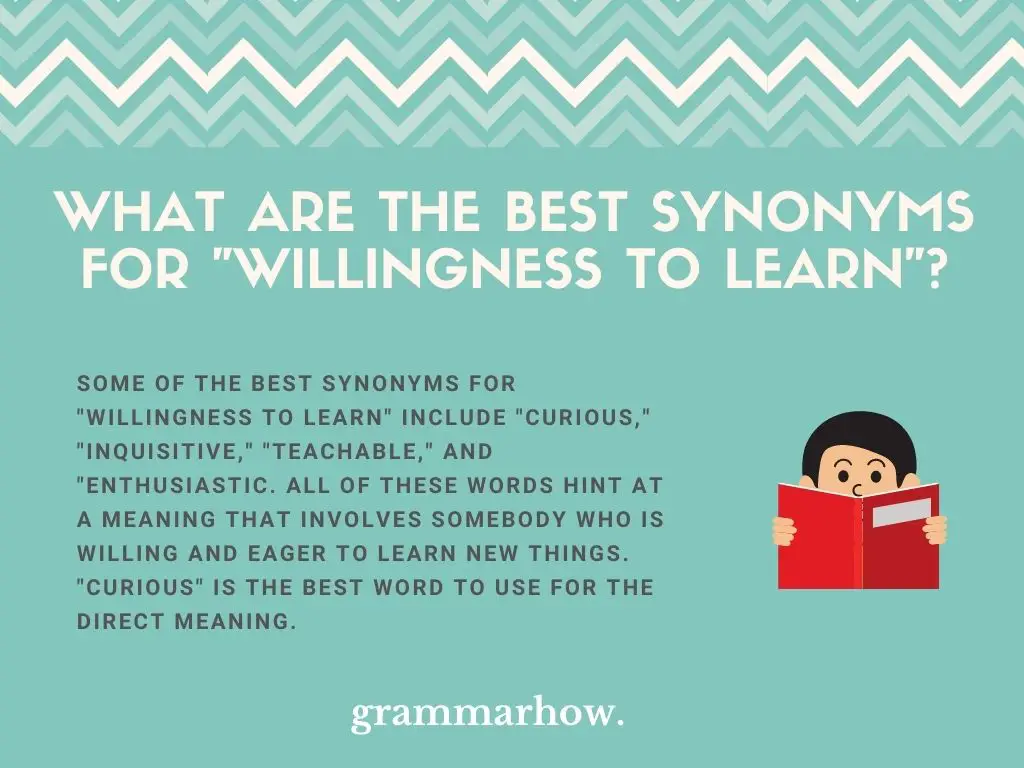People who love to learn don’t depend only on classrooms or professors. They seek answers to every question; their minds are always clouded with ‘how’ and ‘why.’ They have an innate desire to please their inner curiosity and dig deeper until their thirst for answers quenches.
What would you call such a person?
What would be a suitable expression or word for a person passionate about searching, researching, learning new things, and acquiring immense knowledge? Someone who questions everything, looks for answers, and learns with deep understanding.
This is the question I had in mind while deciding the name of this website. Autodidact was the first word that came to my mind, but the name had to be more generic so that people could remember and return to the website more often.
Well, there are many words for the same. Here is a list of the most noteworthy ones:
Autodidact
According to Oxford Dictionary, it means “A self-taught person.” It formed out of the English word Auto (self) and the Greek word didact (teach). In other terms, someone who has acquired knowledge or learned a subject without seeking help from a teacher or formal education institution.
Instead of calling a computer technician, you would fix it on your own.
Philomath
According to Merriam-Webster, it means “A lover of learning: scholar,” especially a mathematics student. This word originated in Greece and was used as a possessor of knowledge in multiple fields.
Polymath
A more profound word for this loveable expression. A polymath is a person whose expertise lies in different subjects. The knowledge is used to solve a specific problem by learnings from every perspective. Polyhistor is another term to describe the same.
Epistemophilic
“Edison had an epistemophilic personality.” This states that Edison had an excessive love or reverence for knowledge. It can be used for – the impulse to inquire.
Sophophilic
Used to describe a person who loves to gather knowledge with a higher emphasis on wisdom. Aristotle and Socrates were the greatest sophophiles of all time.
“There are no foolish questions, and no man becomes a fool until he has stopped asking questions.”
Charles Proteus Steinmetz
Philosophile
A person who loves to learn about philosophy. A love for a certain kind of thinking and approach toward a specific problem. Such a person is always involved in questioning, arguing with their notions and beliefs, and trying to change one’s mind.
Bibliophile
A person who loves books. Bibliophile or bibliophilism is the act of loving books. It may also be known as “Bookworm” for someone who loves reading or reads them for content.
Sapiosexual
It is formed from two Latin words, Sapien (Wise or Intelligent) and Sexualis (Sexes). A person who finds intelligence to be the most attractive feature of a human being. I have often quoted this word several times in my writings. This should be known and used more often by the masses.
Inquisitive
An inquisitive person is intellectually curious, eager for knowledge, and likes to inquire, research and ask questions.
Curious
The most crucial trait of any knowledge lover. If you’re curious, you want to know what makes someone special happy?
“Curiosity is the very basis of education and if you tell me that curiosity killed the cat, I say only the cat died nobly.”
Arnold Edinborough
Amore
Known as the name given to a person who has a deep inner need for quiet, a desire to understand, analyze the world they live in, and learn the deeper truth of this universe.
Erudite
Having or showing great knowledge, mastery, or learning. Possessing or displaying erudition. “An erudious scientist.”
Multipotentialite
Someone who has many different interests and creative pursuits in life. This term is used for someone who displays aptitude and excellence across multiple disciplines like art, economics, and science. Emile Wapnick popularized it in the TED talk Why Some of Us Don’t have One True Calling.
Neophilia
According to Collins Dictionary, it means a tendency to like anything new or a love of novelty. Neophilic is a person who has a fondness for, or obsession with, novelty and change. It is considered a personality trait.
Its opposite is neophobia which means fear of anything new or unwillingness to try anything new.
Learnaholic
The suffix “-holic” is added to a word to denote an addiction to it. Examples: workaholic, readaholic, and chocoholic. Similarly, learnaholic is someone who is addicted to learning and does it more than required.
Wonk
Used in an informal context. According to Cambridge Dictionary, a wonk is a person who works or studies too much, especially someone who learns and knows all the details about something. It relates to enthusiastic interest and excessive attention to minor details in a specialized field such as finance, politics, and science.
Pantomath
A person who wants to know or knows everything. Used to denote a great individual who has achieved the pinnacle of learning and understanding. Finance and advisory companies often use this word to convey relations to extensive expertise.
Leonardo da Vinci was one of the best-known knowledge lovers. He opened corpses to learn how the human body functions, played with candles and canvas to see how shadow works and observed water flow to create mechanics. His life was filled with exciting experiments. To learn better, watch this documentary.
What if the most precise word for this expression hasn’t been coined yet? It is time to put your mind to work. Here is one I came up with, a combination of two Latin words – Curiosus (Curious) + Amator (Lover) = Curiosamator. Make yours and share with this community of knowledge.
Want to start learning new things every day? Start here: 50+ Websites to Learn New Things Everyday
Finding the correct word for eager to learn doesn’t have to be a challenge. It’s great to expand your vocabulary and broaden your knowledge if you can put a word to a description. In this article, we’ll look at good words for a willingness to learn and how to use them.
What Are The Best Synonyms For “Willingness To learn”?
Some of the best synonyms for “willingness to learn” include “curious,” “inquisitive,” “teachable,” and “enthusiastic. All of these words hint at a meaning that involves somebody who is willing and eager to learn new things. “Curious” is the best word to use for the direct meaning.
According to The Cambridge Dictionary, the definition of “curious” is “interested in learning about people or things around you.”
So, in this article, we’ll look at the following words and how they relate to the phrase “willingness to learn:”
- Curious
- Inquisitive
- Teachable
- Enthusiastic
Curious
“Curious” is by far the most compatible word with the meaning we’re looking for. You can use it to mean precisely that somebody is willing to learn about something.
Someone that is “curious” is interested in learning new things. Those things can be about people or things, and the curious person is always interested to find out more.
For the most part, “curious” is a positive adjective we can use to describe somebody who is willing to learn new things. It’s a great way to use a quick and easy word to convey your meaning.
- I’m curious about history, so I asked my teacher for more textbooks.
- He was curious about what was inside the cave and found some amazing things.
- My children have always been curious souls. They’re constantly finding new things to entertain themselves with.
- You’re a curious being, aren’t you!
As you can see, “curious” is a great word to use when talking about somebody who is willing to learn all about new things. You’ll usually use it in a positive way, though that isn’t always the case.
Sometimes, “curious” is used as a negative adjective. That means that people might call someone “curious” who’s a little too eager to learn about new things. While it’s usually good to be happy to learn about things, some people go overboard and put themselves in danger to learn.
You may have heard the old idiom:
- Curiosity killed the cat.
It’s this idea that sometimes lets “curious” be painted in a negative light.
Inquisitive
Next, we want to talk you through “inquisitive.” It’s another great synonym to use and is definitely up there with “curious.” Many people like to use “inquisitive” as a way to talk about somebody who is willing to learn.
“Inquisitive” means that somebody wants to discover and explore new possibilities. They always have a thirst to try new things and won’t rest until they’ve satisfied that thirst.
According to The Cambridge Dictionary, the definition of “inquisitive” is “wanting to discover as much as you can about things.”
Just like “curious,” “inquisitive” comes with both positive and negative connotations. For the most part, it’s a very positive adjective that you can use to describe somebody who is willing to learn all kinds of new things about the world and the people around them.
- I like to be inquisitive about new things and don’t stop learning until I’ve mastered them (which will never happen)!
- He’s so inquisitive about things. You honestly will never beat him at a strategy game.
- You’re the most inquisitive person I’ve ever met. You’ll find a way to appeal to the masses.
- He’s far too inquisitive to be kept here at the office! You need a grander job that appeals to your capabilities.
“Inquisitive” is a great word to use to talk about somebody who is willing to learn. Usually, “inquisitive” people are slightly more impressive than “curious” people because they often have a tactical thought process or are capable of more critical thinking skills.
Generally, “inquisitive” people are also “intelligent” people, while “curious” people might simply be interested in learning new things.
However, “inquisitive” can also be used negatively. You might find yourself calling someone “too inquisitive” when their eagerness to learn about new things annoys you.
In fact, The Cambridge Dictionary definition in full looks like this:
- wanting to discover as much as you can about things, sometimes in a way that annoys people
Teachable
“Teachable” is another great word to use as a replacement to “willingness to learn.”
“Teachable” is used as an adjective to mean that somebody is capable of being taught new things. It usually implies that they’re willing to learn all about new things, making them an easy candidate to teach.
According to The Cambridge Dictionary, the definition of “teachable” is “able to be taught; that can be taught.”
Most of teaching works better when the people you’re teaching are receptive to what you’re saying. If they’re intent on listening and learning, then someone will have a much better time learning from you. It’s these teachable people that make it worthwhile to be a teacher.
- He’s such a teachable student; I couldn’t ask for someone better!
- You’re so teachable. I always have fun studying and teaching with you.
- My teacher said I’m a teachable pupil.
Enthusiastic
Finally, let’s look at “enthusiastic.” This is a great synonym to use, but it doesn’t always relate to a willingness to learn. Enthusiasm can extend to a wide variety of things in life.
“Enthusiastic” means that somebody is eager to do new things. It doesn’t always have to be learning. You can be enthusiastic about a new hobby or a new sport.
According to The Cambridge Dictionary, the definition of “enthusiastic” is “showing enthusiasm.” This means that someone is eager to learn all about new things.
- I’m an enthusiastic person when I’m introduced to new ideas.
- They’re so enthusiastic, and I can’t believe how happy they are to learn about such a boring subject!
- You’re so enthusiastic about school all the time!
While it doesn’t strictly refer to a willingness to learn, it can still be used correctly in that context. That makes it an excellent candidate to use as a synonym.
Martin holds a Master’s degree in Finance and International Business. He has six years of experience in professional communication with clients, executives, and colleagues. Furthermore, he has teaching experience from Aarhus University. Martin has been featured as an expert in communication and teaching on Forbes and Shopify. Read more about Martin here.
Rather than ‘philosopher’, there is an Ancient Greek word: ‘philosophos‘ — meaning ‘lover of wisdom’ (from philein ‘to love’ + sophos ‘wise’).
‘Autodidact’ is one possibility. Although it literally means ‘self-taught’, it does carry the connotations you’re referring to, of self-motivation, intellectual curiosity beyond the bounds of formal schooling; enthusiasm for knowledge.
‘Polymath’ is another, although it refers more to depth and breadth of learning rather than the enjoyment thereof.
‘Bibliophile’ may be a little too specific, referring to the love of the actual artefacts of books, rather than necessarily their contents …
… and ‘bookworm’ doesn’t quite cut it, in this age where we get our information from so many other sources …
If you are not averse to the idea of coining new words, how about ‘cognophile’?
From the Latin roots: cogno, cognoscere — know, cognitio — knowledge, and the Greek: philos …
This is a great question. I’m on the hunt now… I bet there’s a German word for it, or something in Arabic or Hebrew … ‘cognitionis amor‘ was a Latin phrase meaning ‘love of learning’.
(This probably won’t help, but I once had a boyfriend who called me a ‘knowledge junkie’, lol.)

By
Last updated:
December 7, 2022
There are many effective ways to learn English vocabulary—and you can find the perfect one for you right here.
For some people, simply memorizing a word’s definition is enough. Others need entertaining or unique techniques to truly remember a word.
No matter what type of learner you are, we’ll show you how to learn English vocabulary successfully.
Contents
- Make Vocabulary Building Easier by Knowing Your Personal Learning Style
- These 13 Questions Will Reveal the Best Way to Learn English Vocabulary for You
-
- 1. Do Keep To-do Lists?
- 2. Do You Love a Good Conversation?
- 3. Do You Spend Your Weekends Playing Board Games?
- 4. Are You a Movie Buff?
- 5. Are You Good at Spotting Patterns?
- 6. Does Traditional Studying Work for You?
- 7. Are You a Writer (or a Future Writer)?
- 8. Are You Detail-oriented?
- 9. Are You a Bookworm?
- 10. Do You Learn by Doing?
- 11. Do You Love to Travel?
- 12. Are You a Social Butterfly?
- 13. Are You Curious and Always Asking Questions?
Download:
This blog post is available as a convenient and portable PDF that you
can take anywhere.
Click here to get a copy. (Download)
Make Vocabulary Building Easier by Knowing Your Personal Learning Style
What kind of learner are you?
Some people learn best by listening, others learn best by writing. You can’t know which learning tips and methods will work best for you until you know which kind of learner you are.
For example, if you remember words better when you write them down, you should try something fun and productive that involves writing. Try writing a blog.
If you remember words better through repetition, use English vocabulary exercises to boost your knowledge.
It all depends on how you learn best.
Once you figure that out, you are ready to start really learning!
If you are not sure which learning style works best for you, then you can try all of the suggested ways to learn English below. You will learn a lot about yourself and your brain by trying different methods.
These 13 Questions Will Reveal the Best Way to Learn English Vocabulary for You
Words are all around us. Sitting down and looking up words in a dictionary is not the only way to learn English words. You can improve English vocabulary by talking with English speakers, watching TV shows in English, writing in a journal… we’ll show you all of it and more below.
Remember, you may answer “yes” to more than one of our questions below. That’s okay! You can try multiple methods to learn English vocabulary, and mix and match the best ones for you.
1. Do Keep To-do Lists?
Your best way to learn English vocabulary: write down all the new words you hear.
If you’re the kind of person who loves keeping lists—like grocery lists, to-do lists for errands, project ideas, etc.—then use that to your advantage.
Keep a vocabulary list to remember new words that you encounter in English. Put this list somewhere portable (easy to carry around) like a little notebook or your phone, so you can access it from anywhere.
As you find words you don’t know, write them down. Make sure to keep plenty of space between words so that you can write more about the words later. When you get the chance (at the end of the day, or at the end of the week) find out what these words mean. You can write the definition however you want, translated to your native language, copied from the English dictionary or written in your own original words.
However you do it, we recommend also writing down the part of speech (e.g., verb, noun, adjective), different versions of the word (for example, if you write down the word “fish” you could also write down information for fishing, fishy, fisherman, etc.), and a full sentence using the word.
After you have been recording lists for a while, go back and read your old lists. How well do you remember those words from the older lists? Take any words you have forgotten from your old lists and add them to your new list. This is a good way to make sure you continue to improve English vocabulary as you advance.
2. Do You Love a Good Conversation?
Your best way to learn English vocabulary: use new words in conversation.
It can be easy to forget about words you’ve already learned as you move on to new ones. This is especially true for common words and words that you’re not sure how to use.
Try using your new words during the week as often as you can. The more you use the words in English conversations, the better you’ll remember them.
An English language exchange offers a great opportunity to use your new English words in real conversations. If you’re not able to have as many English conversations as you’d like, keep a diary and simply write about your day using the words, or just talk to yourself!
3. Do You Spend Your Weekends Playing Board Games?
Your best way to learn English vocabulary: play English-language board games.
Who said that studying can’t be all fun and games?
English board games like Scrabble offer great ways to learn new words.
There are lots of games you can play to strengthen your vocabulary. In fact, you can find a list of vocabulary board games right here!
Games are a good way to learn because they make learning fun, and they help give you context for your new words. That means you’re giving the word you learn an extra meaning.
For example, you might remember the way that the word was used during the game. You might remember your friend laughing about how the word was used. You might remember that it was very hard to think of that word the first time while playing! Having a real-life memory attached to that word makes it much more memorable.
4. Are You a Movie Buff?
One great way to learn English vocabulary: watch real English language movie clips online.
One of the best ways to learn new vocabulary words is to hear them being used. When you’re talking to an actual person, you might not have time to write down any new words or to look them up in the dictionary.
That’s why videos are a great option for vocabulary learning. Movie clips specifically can help you improve your English vocabulary without being overwhelming. Some virtual immersion platforms make use of movie clips and other videos to teach English.
FluentU, for example, has a dedicated section for excerpts from movies and TV shows. Each video has interactive subtitles that you can click for definitions and example sentences. And you can take a review quiz afterward to test your knowledge of the material.
5. Are You Good at Spotting Patterns?
Your best way to learn English vocabulary: group similar English words together.
As we already mentioned, it is better (and easier) to learn new vocabulary words by giving them some context. One way to do this is to remember words in a sentence. This is a great option because you will not only know the word, but you will also know exactly how to use it in conversation.
Another easy way to learn English vocabulary is to remember words by groups. If you just learned the word “humongous” (very large), you can memorize it by thinking of a group of words getting bigger and bigger—large, huge, humongous. This also gives the chance to learn even more words at the same time.
For example: large, humongous, gargantuan. What do you think “gargantuan” means?
6. Does Traditional Studying Work for You?
Your best way to learn English vocabulary: use English dictionary websites.
Sure, you can use an old-fashioned dictionary to look up a word. But many dictionary websites these days have so much more to offer!
Explore dictionary websites like Vocabulary.com and Dictionary.com and you’ll find lots of resources and things to do or read that can help you learn new words. Online dictionaries often have interesting word-related blogs, games you can play and “word of the day” newsletter subscriptions.
Merriam-Webster even has a learner’s dictionary (with a “word of the day” option that teaches you a new English word every day) with useful words for people learning English. Perfect!
7. Are You a Writer (or a Future Writer)?
Your best way to learn English vocabulary: keep an English writing blog.
Reading blogs is a nice way to learn new words, but writing a blog is even better!
You can start a free blog on many websites like WordPress and Tumblr. What you write in your blog and who sees it is all up to you. You can write about fashion or cats… or cat fashion—write about whatever interests you.
As you write, you will probably need to look up words in a dictionary. As you look up words, you will start to remember many of them! Using them in your blog gives them great context which will help your memory. You will learn exactly how to use them in writing.
Choose a list of words that you want to use before you write the blog. Writing with these words will help you practice and remember them.
Share your blog posts with friends and native speakers. Ask them for feedback. This will help make sure you used your words correctly.
8. Are You Detail-oriented?
Your best way to learn English vocabulary: break words into their parts.
Many words can be broken down into smaller parts. For example, the word “dictionary” comes from the Latin word dictio, which means “to speak.”
This is called the root of the word. A root word is a base used to create many words. Now that you know the root word dictio, you might notice it in other words too, like dictate, dictator and contradict. Even if you don’t know what the words mean, you now know that they have something to do with speaking.
Learning word parts is a great idea because you don’t just learn one word, you also learn other words that use these parts. You will also be better at guessing the meanings of new English words, because you will know what some parts of these words mean.
There are more parts to words than roots. Along with roots, words use prefixes (word parts that come in the beginning of the word) and suffixes (word parts that come at the end of a word).
Many dictionaries break down the word into these parts and tell you where these parts are from. You can find a list of word roots on LearnThatWord, and a more complete list that includes prefixes and suffixes on Macroevolution.
9. Are You a Bookworm?
Your best way to learn English vocabulary: read English books.
Reading is a good way to learn new words, but what you read can also make a huge difference in how much you learn.
Choose books that are a little bit challenging for you, and you will learn a lot more than if you read at your level. If you read a book at your level, you may already know all the words. If you read a challenging book, you will need to learn many new words.
You can also try reading special vocabulary books. These are fiction books that include over 1,000 vocabulary words and their definitions! These books are available to buy online, and can be found at ThriftBooks or by searching Amazon.
10. Do You Learn by Doing?
Your best way to learn English vocabulary: take English vocabulary quizzes.
For many people, memorization is simply not enough. You have to practice and apply what you’ve learned—in other words, “learn by doing”—to truly remember the information.

Try using quizzes to make sure you still remember each word you learned, and to remind yourself of the words you learned a while ago. There are many vocabulary quizzes you can use to test yourself. You can find some at Vocabtest, Merriam-Webster and Vocabulary.com, among many others. Don’t forget that FluentU will always keep you practicing the vocabulary words you learned while watching videos!
11. Do You Love to Travel?
Your best way to learn English vocabulary: link new words to English-speaking cultures.
There are a number of different kinds of English around the world. British and American English might seem the same, but there are many little differences.
If you love to travel and discover new cultures, consider how English words are used, pronounced or spelled in different cultures. This will make them seem more interesting and memorable to you—plus, it will be helpful if you visit different English-speaking countries!
The word color, for example, is spelled as “colour” in British English. British people used the words “brilliant” and “cheers” often, but Americans prefer to say “cool” instead of “brilliant” and “see you” instead of “cheers.”
This is also a helpful idea if you’re already focused on one specific type of English. When you are learning new words, keep in mind which country you plan to visit, live in or work in. You should learn British English if you plan to go to England, American English if you plan to go to the U.S., and so on.
12. Are You a Social Butterfly?
Your best way to learn English vocabulary: study new words with English learning friends.
Learning is easier and more fun when you do it with others!
Find a group of friends who want to learn English with you, get an online native speaking buddy or join a website with other learners. Whatever you choose to do, you will benefit greatly from working with others.
One excellent group learning program you can join is called Toastmasters. This group has meeting spots all over the world, and it helps people learn to speak in public. This can be a huge help to you if you have trouble speaking English with others!
Another great idea is to talk to other English learners on Facebook. There are many Facebook pages for English learners. Some are pages where English learners have created an online community for support and friendship. Other pages have actual native speakers helping the group learn. Find one, and your studying will suddenly get much easier.
13. Are You Curious and Always Asking Questions?
Your best way to learn English vocabulary: ask “what does that mean?” as often as you can!
Finally, never be afraid to ask questions!
If someone uses words you don’t understand, ask them “what does that mean?” Many people are very patient and understanding if you tell them that you’re learning English. In fact, many will actually enjoy helping you!
So, have you found your personal best way to learn English vocabulary? Don’t be afraid to try everything and discover how to learn English vocabulary in a way that works for you. Study hard but have fun, and before you know if you’ll have a gargantuan vocabulary!
Download:
This blog post is available as a convenient and portable PDF that you
can take anywhere.
Click here to get a copy. (Download)
This article is for beginner and advanced learners of English and for those who are wondering how to approach the language. We have compiled tips and resources for every level of learning from Beginner to Advanced.
Features of the English language
- Fixed word order. English belongs to the group of analytical languages. It has many parts of speech and a clear word order: subject, predicate, and one or more objects. Paraphrasing is acceptable, but rarely[1].
- Phrasal verbs. These are expressions consisting of a verb and a preposition or adverb: put up with, slow down, get lost. There are similar constructions in other Germanic languages, but only in English are they used with such love, whether it be in everyday life, work, study, politics, or science.
- Genderless nouns. English nouns have no gender. The advantage here is that you need to coordinate parts of speech only by number.
- Special pronunciation. The rule «as it is heard, so it is written» does not work in English. The writing of this language is based not on a phonetic, but a historical principle. For example, the word daughter is read as [dɔːtə].
-
One word — different parts of speech. Another phenomenon of the English language. Some words change their part of speech, tense, and stress, but not their appearance. For example:
- Read — present tense, read — past tense
- Present — a gift, present — to give
- Close — near; close — shut
- A multifaceted language. English has long ceased to be uniform. There are American, British, Australian, and even Singaporean versions of the language. Within each country, there are many dialects and slang expressionssocial and ethnic groupings. This is especially noticeable in the UK, where there are four varieties of English in London alone. And not all of them are «royal».
- Smart borrowing. There are many loanwords in English. Everyday speech and basic concepts come from the Germanic and Scandinavian languages. And English owes its «beautiful» expressions to French. Compare: freedom (English) — liberty (French); love (English) — affection (French); friendship (English) — amity (French). Science is dominated by Latin and ancient Greek: substance, thesis, metaphor, conjunction, etc. Knowledge and use of these words is an indicator of education[2].
How to learn English on your own
In this block, we will give you some tips on how to learn English.
- Begin learning the language as a whole. Don’t focus on any one skill. All elements of English are interconnected. Without reading, you will not replenish your vocabulary and will not be able to communicate competently. Without listening to foreign speech, you will not understand accents and pronounce words correctly. Focusing on a specific skill is suitable for those who already have a strong base of English. Let’s say you’re studying for the IELTS exam, and know that you’re not very good at listening. In that case, it is logical to devote more time to this aspect. But at the initial stage of learning, it is better to study the language in its entirety.
- Learn the language with fun. Make the process interesting for you. It’s easy to catch the enthusiasm for learning English because it’s so popular. But staying motivated is harder. Try to diversify your learning: apply the acquired knowledge of English to what you like. Are you a computer game lover? Play and chat with foreigners. Love fashion? Read American or British Vogue. Find your niche where you will use the language with pleasure.
- Make mistakes. Don’t be afraid to look stupid. If you are not a BBC announcer, no one will notice your accent and style of presentation. Native English speakers are very loyal to how you pronounce words. The main thing is to convey meaning.
- Practice every day for at least half an hour. Lack of practice kills even the most advanced level of English. And all aspects of the language are important. If you only watch Netflix, your writing and speaking skills will noticeably drop.
Vocabulary
15-25 thousand words make up the vocabulary of a native English speakerdepending on his level of education. For foreigners, 10 thousand is sufficient. With that amount, you can say that you are fluent in English. For understanding and communicating in everyday life, 3000 words are enough (without complex structures)[3].
How far you are willing to delve into learning English depends on your goal. But you still need to learn vocabulary, at least the first 100 words. Even with such a small margin, you will be able to express simple thoughts, «want, drink, shop, me, juice.» Simple and clear. If your goal is to expand your vocabulary, use different techniques.
Learn words from flash cards
Return to childhood. Memorizing foreign words with flash cards is a well-known method. Its essence lies in spaced repetition. On one side of the card is a word written in English, and on the other — its translation. Learn words by laying out cards from several piles. Did you memorize the word? Put it in a far pile. Forgot it? Return it to a closer deck and repeat it again.
Such cards are sold at bookstores, but you can also make your own. If you compile them on your own, you will already remember the word, its translation, and spelling. At a higher level, you can specify its meaning in English. Another option: write not only the word, but a small phrase to go along with it. In doing so, you will immediately remember how to use it in a sentence.
Organize words into groups
Another way to learn new vocabulary is to organize words into groups. These can be:
- Thematic groups (kitchen: knife, bowl, cup, fork, etc.)
- Root words (able, ability, disability, enable, etc.)
- Similar words (beautiful, charming, splendid, pretty, fine, etc.)
- Expressions with one phrasal verb (put aside, put on, put out, etc.)
This method is good to use in combination with flash cards: distribute them among different topics.
Learn words in context
Learning a language in context means to immediately make sentences from new vocabulary. And be sure to say them out loud. This way you will learn how to use new words in conversation.
Resources
| Resource | Level | Specifics |
| Learn English Vocabulary | A1-A2 | Vocabulary replenishment by thematic lessons |
| English Vocabulary in Use | A1-A2 | Textbook for learning words in context for each level |
| Business Vocabulary in Use | B1-B2 | Special textbook for learners of business English |
| VisuWords | C1 | Visual dictionary of associations |
| Sentencedict | A1-C1 | Online resource that puts any word into a sentence |
| Dicts | A1-C1 | Visual online English dictionary |
| Abby | A1-C1 | Online English dictionary that translates words and phrases |
| Quizlet | A1-C1 | Online resource where you can learn words from either your own or ready-made flash cards |
Grammar
Two opinions exist about the importance of grammar at an elementary level.
- First: you need to focus on vocabulary, and grammar will follow later. You can communicate with a native English speaker without coherent wording — you will still be understood.
- Second: grammatical constructions are a must. They allow you to understand the meaning of the phrase even without knowing individual words.
The choice of approach to learning grammar is up to you. If you need English for work or study, grammar is indispensable. If you are learning it for traveling, a basic grammar base is sufficient. Determine a set of constructions that you will definitely need. For example, simple tenses, singular vs. plural constructions (there is/there are), several phrasal verbs, and modal verbs (can/be). This is enough for the beginning.
Learn to understand the structure of the language
We advise beginners to first understand the structure of the language: how phrases are built, what parts of speech and simple tenses are. Don’t jump right into the Present Perfect and irregular verbs. Learn grammar gradually. At a basic level, you just need to understand what parts of speech look like and their order in a sentence. Here is an example from Alice in Wonderland: «All mimsy were the borogoves, and the mome raths outgrabe.» Those who know the language already see the structure: pronoun, adjective, verb, noun, and so on. The meanings of the words are not clear to us, but we feel the general meaning of the sentence. This is because we understand the grammatical structure of the phrase.
Practice
Knowing grammar rules and using them in real life are two different things. It makes no sense to cram them from morning to evening. It’s both boring and useless. Grammar constructions need to be practiced, both in writing and out loud.
Resources
Listening
Live English speech is different from a textbook disc recording. To understand how native speakers communicate in real life, listen to current radio shows and podcasts, and watch TV shows. That way, you will learn to recognize words by ear, understanding intonations and accents. The latter is especially important in English. If you are used to American English, you will not understand British posh in the right way: loo instead of toilet, cab instead of taxi, and the eternal word bloody. New Zealand and Australian accents are infamous even among native speakers.
Listen to the radio and podcasts
This is a great way to «feel» the language in real life. For beginners, educational podcasts are suitable. For example, the BBC regularly posts three-minute recordings on various topics — especially for those who study English. Interesting podcast series can be found on the British Council website. And the Podcast in English resource allows you to select audio files by language level. If you want to achieve an American accent, look for podcasts on American English Podcast and Voice of America.
Gradually increase the difficulty of what you are listening to. Listen not only to podcasts, but also to the radio. Try to diversify the materials with programs from different countries, such as ABC Radio Australia or Virgin Radio UK. The general rule when listening is to understand at least 80% of the words. If half of the spoken phrases are incomprehensible, try an easier podcast.
Watch TV-shows and series
Learning English by watching TV series sounds tempting. But this method is only suitable for improving skills. It will not work without a certain amount of knowledge. If you are itching to turn to this method, watch special educational series, like Extra. This is a British sitcom that teaches foreign languages. The dialogues of the characters are simple and understandable, designed specifically for basic proficiency.
When you attain a good amount of vocabulary, move on to more serious things, but with subtitles. First in your native language, then in English, and eventually turn them off for good. If you’re already at an Advanced level, be sure to turn on comedy shows. Understanding English humor is the pinnacle of language proficiency.
You can watch TV shows and movies in the original formats on streaming services: Hulu, Netflix, HBO. The main idea is to watch what you like. Love Friends? Excellent. Prefer documentaries about whales? That’s great too. The only disadvantage to this method is that after watching films in English, dubbing in your native language becomes unbearable.
Listen to lectures and audiobooks
Another option for listening — lectures in English. This is especially useful for those who plan to study abroad, given that it provides the means of listening to and memorizing academic English. There are many lectures on Coursera and university websites such as Oxford, Harvard, and MIT.
If you love fiction, try audiobooks in English. Beginners can start with children’s books, such as Charlie and the Chocolate Factory. There are even audiobooks voiced by famous actors. How do you like this combination of pleasure and practicality? The downside is that many audiobooks aren’t free. However, you can always try a free month trial on Audible or look for affordable options on Digital Book.
Resources
| Resource | Level | Specifics |
| Learn English General English Podcasts | A1-A2 | Podcasts for beginners from the British Council |
| BBC The English We Speak | A1-A2 | Short podcasts for beginners from the BBC |
| Podcast in English | A1-B2 | Educational podcasts for A1-B2 levels |
| Culips | B1-B2 | Educational podcasts with different topics: vocabulary, grammar, everyday life |
| BBC 6 Minute English | B1-B2 | Another podcast from the BBC, but for more advanced learners |
| Espresso English Podcast | B1-C1 | Educational podcast: explanations of similar words, rules, and pronunciation |
| Learn English with TV-Series | B1-C1 | Youtube channel with educational videos based on excerpts from films, series and cartoons; the text of the dialogues is provided, and new words are highlighted and explained by the announcerin English |
| All Ears English | C1 | Podcast for advanced speakers to improve English skills |
| On Being | C1 | Acclaimed American podcast discussing philosophical and social issues; a transcript is provided |
| Science Vs | C1 | Podcast about science: current topics, myths, and explanation of scientific phenomena |
Reading
Reading is an essential skill for anyone who learns English, especially when it comes to studies and work. Through reading, you replenish your vocabulary and consolidate your knowledge of grammar with vocabulary. Granted, such a question arises — what should you read?
Adapted books
An adapted book is a simplified version of a known work. They are suitable for those who have just begun to understand the English language. If you don’t want to buy a book, look online — for example, on English e-Reader. If you are still learning how to read, practice with small texts, like those offered on Rong-Chang. Adapted books provide a list of new words for each chapter. They are clear and simple. An interesting option is The Cat in the Hat. This children’s book consists of only 220 words and is suitable for the Elementary level. Every book you read motivates you to further learn English.
Parallel texts
This is a method in which you read a text and its translation, literary or literal. You have two languages in front of your eyes: English and your native language. As a rule, they are located on adjacent pages: on the left is the English version, and on the right is the translation. There is another option in which translations are opened by clicking. This way, you can see the translation of only the phrases you are interested in. Parallel reading is not for everyone. Firstly, you need to have already mastered the basic rules and skills of English. Secondly, it may be unusual for you to read a text on two pages. There are a number of resources on the Internet with parallel texts: the Smart Book and Parallel Books applications, etc.
Fiction
When you have moved on to the Intermediate level, proceed to the «real» literature. Start with those books that you have already read in your native language. This way, you will know in advance the essence of the work and the translation of some phrases. Raise the level slowly. It makes no sense to tackle Jane Eyre immediately after the Kipling stories. When reading a book, pay attention to grammatical constructions: how the author builds phrases and uses parts of speech.
Choose novels carefully. There are many beautiful words and correct grammar in the classics, but there is no actual vocabulary. Spice up your reading with contemporary books. They have slang and trendy themes that will be useful today, rather than the 19th century.
If you are learning English for work, focus on professional literature and the news. And future students should pay attention to academic publications: National Geographic, The Economist, Scientific American, etc.
Resources
| Resource | Level | Specifics |
| Rong-Chang | A1-A2 | Simple texts for beginners |
| English Online | A1-A2 | Adapted articles for the Pre-/Intermediate level |
| Learn English Through Story | C1 | Youtube channel with books in English; a narrator reads aloud the text, the words of which you follow on the screen |
| Anylang | C1 | Reader-app with translation |
Writing
First, determine how important this skill is for you. If you are learning English for the purpose of tourism, it is not particularly useful. But for international exams and education abroad, spelling and knowledge of different text styles are vital.
Find a proofreader
To develop your writing skills, you need to find someone who is willing to proofread your writing. You can ask native speakers for help. For example, HiNative is a convenient service built in a question and answer format between foreigners. If you are not yet ready to communicate with English speakers, use literacy testing applications: Grammarly or Sentence Checker. However, these applications only check for actual spelling, punctuation, and style errors. Thus, it is better to contact someone who speaks English.
Correspond in English
Find yourself a pen pal, preferably among native speakers. You can find one on Interpals, Conversation Exchange, Hello Talk, Ablo, and others. By communicating with a native speaker, you improve your writing skills. But remember that the «native speaker» label does not mean perfect language proficiency. Think about how often speakers of your own language make mistakes. The same occurs with the British and Americans. This method is ideal for practicing and developing an existing base, but not for learning from scratch. In the latter case, it is better to turn to similar platforms that are aimed specifically at education like Italki. There, you will find not just a pen pal, but an English teacher.
Keep a diary or blog in English
The key to developing writing skills is practice. To make this process interesting, try journaling in English. Another entertaining form of writing practice is keeping a blog. Start leaving comments on social media networks and get an English-language account on Twitter or TikTok. Doing so is good for developing language skills and overcoming shyness.
Resources
| Resource | Level | Specifics |
| Italki | A1-C1 | Site where you can find an English teacher among native speakers |
| Slowly | A1-C1 | Chat app that mimics real mail |
| Paltalk | A1-C1 | Application for communication with foreigners; has video and audio chat functions |
| HiNative | A1-C1 | Q&A community for native speakers |
| Grammarly | A1-C1 | Grammar, punctuation, and style check |
| Sentence Checker | A1-C1 | Spelling check |
| Write and Improve | A1-C1 | Site where you choose your level and complete assignments: essays, personal letters, reports, etc.; works are graded from A1 to C2 |
Speaking
For beginners, speaking is the most attractive part of the learning process. In fact, for many, it is the main goal. They don’t need grammar and spelling rules. The main thing is to learn to understand and be understood. How do you begin speaking English?
Speak words out loud
Newbie advice couldn’t be easier — say your first words out loud. Learned the pronoun I, the verb eat, and the noun soup? Put them into a sentence and verbalize them. Congratulations — you have just started speaking English! It’s far from perfect, but the first step has been taken. Now, repeat the same thing with all of your learned words, immediately putting them into practice. This is how you develop the habit of speaking English. You need to deal with speaking right away. Otherwise, the moment will come when you have a large vocabulary and knowledge of all 12 tenses, but you’re incapable of putting them into words. You should get used to using the language and feel comfortable.
Expand your vocabulary
It is necessary to correctly replenish vocabulary, which is both active and passive. Active vocabulary are those words that we use regularly. Passive vocabulary are less used words that are collected in our heads. We know these words, but we do not use them in colloquial speech. To understand the difference between active and passive vocabulary, compare your reading and speaking skills. Let’s say you read in English and understand the words ubiquitous, tremendous, and aberration. But when you want to use these words in speech, you just can’t seem to remember them. The only way to fix this is with practice. Make up sentences from these words, be sure to speak aloud and repeat them in variations. This is how you can incorporate them into your speech.
Communicate in English
The most effective and interesting method of communication is with a native English speaker. There are several applications where you can find a speaking buddy: Tandem, Easy Language Exchange, and others. If you are a travel lover, use the Couch Surfing service. Through it, you can find a person who is willing to give you shelter in another country. But even if there isn’t a native speaker nearby, don’t be discouraged. Go to conversation clubs and have game nights in English with friends.
Immerse yourself in the language environment
The best way to learn a language is to move to a country where it is spoken. This way, a person enters an environment where everything is in English. Most of the time he listens, reads, and lives in this language. If you don’t have the opportunity to travel to London or New York, create a language environment at home. Watch TV, listen to the radio, read, play, and think only in English. Use it in the little things. For example, translate your phone layout and all social media networks into English.
Resources
| Resource | Level | Specifics |
| Tandem | A1-C1 | Application for communication with native speakers of foreign languages; has video chat and voice message functions |
| Easy Language Exchange | A1-C1 | Site for meeting native speakers of another language for mutual learning |
| Speaky | A1-C1 | Application for communication with native speakers of foreign languages; has video chat and voice message functions |
| Couch Surfing | A1-C1 | Application for finding local residents willing to host you in another country |
Pronunciation
We all want to speak English without an accent. But is it possible? English has so many dialects that one can forget about any single form. There is, of course, RP — Received Pronunciation — the standard of the royal family and BBC announcers. But in reality, only 2% of the British population uses it[-]. Therefore, in the case of pronunciation, our first advice is to humble yourself. You will never speak with a perfect English accent because it simply doesn’t exist. Choose the version of the language that you like and focus on it. Do you dream of speaking like a Bostonian? If you are determined to perfect your pronunciation, here are a few recommendations.
Learn phonetic transcriptions
At first glance, phonetic transcriptions seem like a relic of the past — an echo of old school methods. In fact, knowledge of transcription allows you to understand the pronunciation of words. Yes, this is not the first thing many people start with to learn English. However, for good pronunciation, you need to understand how words are written phonetically.
Work with a professional
To develop proper pronunciation, you can’t do without the help of a specialist. This is what linguists do. They explain special techniques, the position of the tongue and teeth, among other subtleties. You should contact a linguist if you are striving for RP or want to keep your native accent to a minimum so that no one suspects that you are a foreigner. The downside is that their work is expensive. The method is suitable for those who already have an excellent command of the language.
Learn pronunciation by listening
You can get rid of a strong accent on your own. The main thing is to remember that there is no way of escaping it in the beginning of the learning process. Listen to as much English speech as you can and repeat after the speaker. Do it out loud or quietly, moving your lips. It will take a lot of time and practice, but the results will soon follow. Watch a series of videos from the BBC where they show the correct pronunciation.
Don’t forget to work on intonation. In English, it is markedly different. No matter how rich your vocabulary or good your accent is, you will not sound like a native speaker without proper intonation. Listen to the radio, podcasts, and repeat after the speakers. You can even repeat lines from your favorite movies. For example, «Say hello to my little friend!«Scarface, 1983. And don’t forget to add more expression.
Be consistent
A common mistake of those who learn English on their own is to grab accents from different sources. Try to be consistent. At first, beginners don’t see the difference between dialects and remember everything they come across. The result is porridge. You can start with American, put in Australian slang, and end on a high Irish note. This will definitely expose you as a foreigner. Are you planning to live in England? Listen to and learn a British accent.
Resources
Need to learn a language?
You have a wide range of ways and places to learn English. They can be divided into four categories:
- Language schools (group lessons)
- Individual lessons with a tutor
- Language courses abroad
- Independent study of English
Read more about the pros and cons of these methods in separate articles.
Sites for finding an English tutor
| Resource | Specifics |
|---|---|
| Preply | International platform; you can find a tutor from another country |
| italki | Native speaker-teachers from different countries |
| Cambly | Classes in the form of a conversation with a native speaker |
Language courses abroad
| Country | Price per week — General English20 hours per week | Price per week — Intensive English Course30 hours per week |
|---|---|---|
| USA | 375 USD | 430 USD |
| United Kingdom | 215 USD | 277 USD |
| Australia | 154 USD | 235 USD |
| Canada | 310 USD | 350 USD |
| Ireland | 167 USD | 300 USD |
| Malta | 159 USD | 242 USD |
| Hong Kong | 325 USD | 350 USD |
Read more
Resources for an independent study of English
| Resource | Specifics |
|---|---|
| Memrise | Website for independent language learning. There are courses for beginners. Grammar exercises only work on the mobile app. |
| Duolingo | Platform for learning foreign languages. Many tests and tasks in the form of a game. Little time is devoted to speaking. |
| Learn English | A resource from the British Council for English learners. Suitable for different levels. |
| Learning English | Website from the BBC with materials for working out English skills. There are different courses, tests and quizzes for self-examination. |
| ESOL Courses | Free materials for independent study of English. They are divided into blocks: listening, reading, writing, speaking, and vocabulary. |
| English with Lucy | YouTube channel with explanations of the rules, complexities and different aspects of the languageBritish English. YouTube channel with explanations of the rules, complexities and different aspects of the language. |
Why learn English?
English is the most popular language in the world[4]. 1.35 billion people speak itnative and non-native speakers — one seventh of the world’s population. Only Chinese comes close to it[4]. But while the latter holds an official status in only two countriesChina, Singapore, English is the official language of 55 nations. In that sense, it fully justifies the title of a global language.
English for studying
Knowing English gives you many opportunities to study abroad. However, your choice is not limited to the UK, USA, Canada or Australia. Universities around the world are opening programs in English: this is how they attract more foreign students[5]. You can study English programs in Germany, Singapore, Saudi Arabia, Russia, etc. But pay attention to the price difference. In many countries, education in the national language is cheaper or completely free, but English-language programs are the most expensive.
Moreover, in order to study in English, you must have a proficient language level — not lower than B2-C1. For language courses and short-term programs, the requirements are lower — A1-B1 is sufficient. Universities accept IELTS, TOEFL, and Cambridge Exams. TOEFL is more popular in America, while IELTS is common in England. For universities in non-English speaking countries, the required exam is indicated in the requirements. As a rule, this is the same trio: IELTS, TOEFL, and Cambridge.
English is a monopolist in the field of science and education. It is the language of most academic journals. If you want to conduct scientific research at the international level, you need to know the language.
English for work
Knowing English is a valuable skill. CELACambridge English Language Assessment research has shown that employers offer better conditions to candidates who know English. They move up in the company twice as fast and receive promotions[6]. But, «English for work» is an abstract concept. To narrow it down, you need to start from your specialty and place of employment. If you aspire to work at a company abroad, you will need a language level of B2for the medical field — С2.
When learning English, focus on professional vocabulary. You can’t learn certain aspects of the language separately, but you can focus on «essential» skills. For example, pay more attention to business correspondence or communication with foreign clients.
| Country | Language level for a work visa | Min. points for a work visa |
|---|---|---|
| USA | B1-B2 |
|
| United Kingdom | B1 | IELTS — 5.0 |
| Canada | B2 |
|
| Australia | B1-B2 |
|
| New Zealand | B2-C1 |
|
English for immigration
Another reason to learn English is for immigration. The US, UK, Canada, and Australia are among the top ten most popular migration destinations. In America, which ranks first, the share of migrants is 15% of the local population[7].
Those wishing to move to an English-speaking country must speak the language at a decent level. This is necessary for the adaptation into a new society. But not all immigrants are required to know English at C1. For children, spouses, and other family members, it is sufficient to have beginner knowledge of the language. To confirm your level of English, you will need an IELTS or Cambridge Exam certificate.
| Страна | Living costs per monthfor one person; not accounting for rent | Avg. monthly paycheckafter taxes |
|---|---|---|
| USA | 930 USD | 3,530 USD |
| United Kingdom | 810 USD | 2,398 USD |
| Canada | 919 USD | 2,450 USD |
| Australia | 885 USD | 3,247 USD |
| New Zealand | 833 USD | 2,499 USD |
There are a number of intricacies in learning English for immigration. First, focus on everyday vocabulary. Your main goal is to learn the language so that you can communicate in life situations: hospitals, hairdressers, migration offices. Much of this will come with time, but it’s best to have a head start. A second point is to study the cultural aspects of the country you are planning to move to. Some language schools offer special English immersion courses. Finally, you can take a chance and come without any knowledge of English at all. In America, for example, many migrants live in isolated communities where they speak only their native language[8]. But think about it — is that really the purpose of your move?
English for travel
Due to its prevalence, English has become the first language for travelers. It seems that there are people who speak English in every country of the world. This is partly true — the question is how many. For example, in Russia, 63% of the population is «familiar» with English, but only 5% speak it fluently. It would be easier for foreigners to learn a couple of words in Russian — this way they will be understood faster. English is mostly spoken by residents of European countries. Thus, it is not necessary to learn all of the languages of the European Union to travel around the continent. But in Asia and South America, English isn’t at all prevalent[9].
A tourist does not need to know complex grammatical constructions. Therefore, if your goal is to learn English for travel purposes, you can study it yourself. Plus, you do not need knowledge of writing: only conversation and the ability to understand your interlocutor. Who knows, maybe you will start learning English for travel, and eventually reach the Advanced level!
English for yourself
English can be learned without a big goal in the form of study or work. Often, people are fond of learning English «for themselves». The reasons can be very different: to watch movies in the original language, read Jane Austen, understand teammates in MMORPGs, etc. By learning something new, you train your brain — neural connections are created. It has been scientifically proven that foreign languages develop memory, improve concentration, and simply broaden one’s horizons[10].
Find language courses
English proficiency exams
International English exams are taken for various reasons:
- Certificate required for admission to a foreign university
- Language proof required for a work or immigration visa
- Proficiency check for personal reasons
- Confirm English skills for work
It is suggested to prepare for English exams in advance. The main thing in any of them is to study the structure. As a rule, they consist of four blocks: listening, reading, writing, and speaking. In fact, all of these exams are standardized tests. Therefore, the key rule in preparation is practice. Try to finish the tasks as fast as you can and practice skills for each part of the exam.
List of international English exams
International exams
@ colin,
It depends on what you mean by » from scratch». The Romanian words are recognizable but not necessarily identical to the Romance vocabulary in French, or English or Italian. Here is an article from Radio Romania, which has a lot of recognizable Romance words. If you study the Patterns series in our library at LingQ, which uses more day to day vocabulary, you may find fewer recognizable Romance words.
Audierile în cazul fraudei de la liceul Bolintineanu continuă
Astăzi, 14:13
Comentează
de Cristina Ghioca
20 dintre cei peste 30 de elevi audiaţi până acum nu au putut preciza dacă s-au dat bani pentru a influenţa comisia de la bacalaureat, spune avocatul directorului liceului.
Share on email Share on facebook Share on twitter Share on digg Share on linkedin More Sharing Services
1
Foto: Arhivă
Peste 30 de elevi au fost audiaţi până acum la Poliţia Capitalei, în cazul suspiciuni de fraudă la bac de la Liceul Bolintineanu, a declarat avocatul George Moloman, avocatul directorului de la liceul Bolintineanu, Costica Vărzaru, care a participat la audieri.
Potrivit acestuia, douăzeci dintre elevi au spus în faţa procurorilor că au dat bani pentru clopoţel, banchet şi închirierea de robe şi album foto, dar niciunul nu a putut să precizeze dacă s-au dat bani pentru a influenţa comisia de la bacalaureat.
Avocatul a mai spus că au fost doi elevi care au spus că au auzit că s-ar fi dat bani, 100 de lei, dar nu au putut să precizeze de unde au auzit, unde s-au dat şi pentru ce.
Audierile continuă la Poliţia Capitalei, transmite redactorul Radio România, Daniela Mănuţă.
Notele de la bacalureat au fost afişate la licee şi au fost postate pe site-ul ministerului educatiei.
Au promovat 55,4% din elevii care au susţinut examenul de bacalaureat, cu 11% mai mult ca anul trecut.
Creşterea se datorează diferenţierii subiectelor, spune ministrul educaţiei Remus Pricopie.
Premierul nu este de acord cu generalizările privind fraudarea examenului
Premierul Victor Ponta i-a felicitat pe toţi cei care au promovat examenul de Bacalaureat, informează redactorul Radio România, Cristina Grecu.
El a arătat că nu este de acord cu generalizările privind frauda şi nici cu cele potrivit cărora toţii copiii sunt prost pregătiţi la bacalaureat.
Victor Ponta a anunţat că aşteaptă luni explicaţii de la ministrul de interne, Radu Stroe, în legătură cu acţiunea poliţiei de vineri, de a lua cu autocarele elevii pentru a fi audiaţi.
El spune că dacă s-au făcut abuzuri, cei vinovaţi vor fi traşi la răspundere.
Learning a foreign language isn’t always easy, especially when it comes to vocabulary. (I’ve been studying Japanese for years and still have trouble remembering words!) Luckily, there are many ways you can learn English vocabulary—and some of them are even a little fun!
In this guide, we go over the top five methods you can use to learn English words and give you a few tips on how to find English words to study.
Feature image: Nicolas Raymond/freestock.ca
Method 1: Make Flashcards
One of the most popular (and arguably best) ways to learn English vocabulary is to use flashcards. Each flashcard will have one English word written on the front and the word’s translation or definition on the back.
To study them, you’ll look at one side of a card and say the word on it in the opposite language before you look at the other side of the card (so if you were looking at the English side, for example, you’d say the word in your native language).
Flashcards are excellent resources because they help you memorize vocabulary words both quickly and effectively. They’re also customizable and reusable. Both paper and digital cards are available, and you can make your own cards, buy a pre-made deck, or download a deck online.
Pros
- Flashcards are easy to make. If you’re making paper cards, all you need are note cards (or small pieces of paper), a pencil or pen, and a list of the words you want to study. For digital cards, all you need is a computer and some software or a website to make them with.
- They’re interactive, especially if you make them yourself. With paper flashcards, you must write down all of the words you want to study as well as physically thumb through the cards, helping you concentrate on what each word means.
- Flashcard decks are easy to expand if you find new vocabulary you want to study. All you need to do is make a new flashcard and then add it to your deck—that’s it!
- They’re easy to randomize. Mixing up the order in which you study is essential to ensuring that you fully understand the meanings of the words you’re learning.
Cons
- Making flashcards is time consuming. Though not particularly difficult to make, flashcards can take a long time to create (regardless of whether you’re making paper or digital cards). Therefore, make sure you have ample time to set aside when making them.
- Paper flashcards are bulky and take up a lot of space. As a result, they’re often difficult to take places and use for on-the-go reviewing. If you’re hoping to brush up on your English vocabulary at places other than home, consider bringing only some of your cards with you or using a more compact resource such as a list (see method 2 below).
How to Use This Method Effectively
Flashcards must be used in specific ways in order to be effective for English-language learning. These methods differ depending on whether you’re studying with paper or digital flashcards.
Paper Flashcards
Paper flashcards are best for those who prefer more traditional study methods and want a break from computers and smartphones.
You can use any blank note cards to make your flashcards. Once you have some, start making your cards: with each card, write an English word (spelled correctly!) on the front and its translation in your native language (or an image of the word) on the back. You may also include on the front the word’s part of speech and/or a sample English sentence.
When finished, begin studying your flashcards using the «waterfall» method. With this method, you’ll study cards in subsets (smaller stacks of cards) and get to review harder English words more often than words you already know.
We explain the waterfall method in more detail in our guide to TOEFL vocabulary flashcards. However, to summarize briefly, here’s how it works:
#1: Go through all of your flashcards and make two piles: a «Know It» pile (with words you know) and a «Struggled» pile (with words you don’t know). Put the «Struggled» pile to the right of the «Know It» pile:
#2: Next, go through the cards in your «Struggled» pile one at a time. As you do this, make a second «Know It» pile for words you know (put this pile to the right of your original «Know It» pile). For words you don’t know, put them back in your «Struggled» pile.
#3: Continue this process of going through your «Struggled» pile and making new «Know It» piles until you only have four to five cards left in your «Struggled» pile. Here’s what your cards should look like:
#4: Now, work your way back up your «waterfall» of cards, starting with your «Struggled» pile. Go through this stack of cards until you know all of the words in it. You might have to go through it several times before you can remember all of the words.
#5: Combine the «Struggled» pile with the «Know It» pile directly to the left of it. Now, you’ll go through all of the words in both piles (combined as one) until you know all of these words.
#6: Repeat step 5 until you’ve gone through all of the cards in your deck, from right to left. You should now know the meanings of all of the English words on your flashcards!
Digital Flashcards
Some people (myself included!) prefer studying foreign languages with digital, or computerized, flashcards. These types of flashcards are accessible through software applications, websites, and/or apps.
While there are many free flashcard-making websites and programs available, my personal favorites are Anki and Memrise.
Anki is a free downloadable software through which you can make your own flashcards or download pre-made decks submitted by users. It uses spaced-repetition software (SRS) to show you difficult cards more often—similar to the waterfall method described above—making it convenient and easy to use.
Memrise, on the other hand, is a free language-learning website that offers tons of pre-made decks. It’s a little flashier and more game-like than Anki, so if you’d prefer a more «fun» way to learn English words, this is a great website (and app!) to try out.
Method 2: Make a Study List
Another helpful method is to make a list of all of the English-vocabulary words you want to learn. A list is different from flashcards in that it has all of the words you need to know in one place (instead of on separate cards). If you don’t want to deal with the hassle of using note cards, a study list is a solid option.
Pros
- The biggest benefit is that lists are easy to expand as you come across new words you want to know. For example, if you saw an English word you didn’t know on a sign at a restaurant, you can simply take out your list and write it down.
- You can use your list as a base for other study methods. Lists are helpful resources for identifying specific words to put on flashcards and use in vocabulary quizzes (see method 4).
- A list is less bulky than flashcards. With a list, you can keep track of dozens of words on a single sheet of paper, taking up far less space than hundreds of flashcards.
- It’s easy to make. All you need to do is write out each word, its part of speech (optional), and its meaning in your native language—nothing more!
Cons
- They’re pretty tedious and boring to work with. Unlike flashcards, which are highly interactive (you can make cards, flip through them, shuffle them, etc.), lists are static resources with few stimulating features.
- They make it difficult to randomize words. You’ll learn English words faster by sporadically mixing up the order in which you study them, but it’s a challenge to randomize words on lists since you can’t physically rearrange them as you can with flashcards.
How to Use This Method Effectively
Write your English words on the left side of a piece of paper, from top to bottom. I suggest numbering the words and adding their parts of speech, too (this is helpful because it teaches you how to use the words).
Then, on the right side of the paper, write the translation of each word in your native language (again, from top to bottom so that each translation aligns horizontally with its English equivalent). Here’s an example:
When you’re ready to start studying, get a separate sheet of paper (or your hand) to cover up the words on the right. You’ll then move this sheet down as you read and define each English word on the left. Make sure to say each word aloud in English before translating it into your native language.
Once you’ve defined a word, move your sheet of paper down to check that you’ve translated it correctly:
As you go through your list, consider marking any words you’re having trouble remembering. This way you’ll know right away which words you need to spend a little more time on than others.
Here are some additional ways you can use your list to learn English vocabulary:
- Study words in reverse. With this method, you’ll start at the bottom of your list and reveal words one at a time by moving your sheet up instead of down. This prevents you from simply memorizing the list in one particular order.
- Cover up the English side so that you must read the words in your native language and then translate them into English. Studying like this ensures you can come up with English equivalents for words all on your own.
These are both great methods to use after you’ve used the main method described above and are more familiar with the English vocabulary on your list.
Method 3: Write Out Words Repeatedly
If you want to practice spelling English words and like doing something physical as you study, writing out words is a solid option to try. With this method, you’ll write out each English word several times as you say it aloud.
If you’ve taken English courses in the past, you’ve probably had homework similar to this (I had to write out new words all the time for Japanese class in junior high and high school!). Although rote memorization isn’t everyone’s cup of tea, it can still be a highly effective way to learn English words.
Pros
- It’s interactive. Unlike flashcards and lists, which you merely look at to study, you’re always doing something when writing out words. If you’re the type who gets easily antsy and likes having something to do with your hands as you study, this is a good method to try.
- It helps you remember how to spell words. Flashcards and lists mainly teach you what a word means, but writing out a word (rather than looking at it briefly) makes it far easier to remember how it’s spelled.
Cons
- Writing out words repeatedly can feel monotonous. Despite being an effective method, rote memorization isn’t a particularly fun way to learn a language and gets tiresome fast.
- You can easily lose focus on a word as you write it again and again. To truly benefit from this method, you need to focus on what each word means and how it’s spelled. Unfortunately, the repetitive motions make it easy to fall into a zombie-like stupor.
How to Use This Method Effectively
The best way to write out words is to have a set number of times you’re going to write them out. Usually, 10 to 20 times is sufficient. Just make sure you’re actively thinking about each word as you write it out: look at the letters and how they’re arranged, pronounce it, and then define it.
I find that it’s helpful to note the translation of each word (in your native language) above your repetitions so that you don’t forget the meanings of any words and can more readily make associations between words in your language and in English.
Finally, I strongly suggest using this method with one of the two methods above (flashcards or a study list) to keep you from getting bored with your studies. Personally, I think the flashcard method is better as it’s more fun and doesn’t require you to make another long list of words.
Method 4: Take Vocabulary Quizzes
If you’re tired of flashcards and lists, vocabulary quizzes are a great way to test what you’ve learned and ensure you truly understand the meanings of English words.
Many English-word quizzes are available for free online. While some are traditional tests, others are more game-like; for example, you might find a matching game in which you have to match English words with their meanings (also in English!).
You can also make your own vocabulary quizzes using any of the resources above (flashcards, lists, etc.).
Pros
- They check your English progress by testing what you’ve learned. Quizzes let you see whether you truly know the English words you’ve studied and can use them fluently. If you fail a quiz, you’ll know exactly which words to work on more.
- Most online vocabulary quizzes are free. You can find tons of free, high-quality English-language quizzes and games on websites geared toward students, ESL learners, and general language learners.
Cons
- You can’t really learn words from scratch using quizzes alone. In other words, you’ll need to combine quizzes with one or more of the methods above so you can learn English vocabulary before testing out what you know.
- Some online vocabulary quizzes aren’t super high quality, so make sure you’re choosing ones that have words you are familiar with and no glitches or inaccuracies.
How to Use This Method Effectively
You have two options when it comes to English-vocabulary quizzes: look for pre-made quizzes online, or make your own.
Online Quizzes
If looking for quizzes online, I recommend starting with popular learning websites.
One option is Free Rice, whose «English Vocabulary» mode tests your knowledge of various high-level English words. Each question gives you one English word and four possible synonyms; the answer choices are also in English, so you’ll need to have a high English level in order to do well. For each question you get right, Free Rice donates 10 grains of rice to help end world hunger. So this is an excellent resource to use if you like the idea of helping others as you study!
Quizlet and Cram are two other websites you can use for free. Both offer flashcards, vocabulary lists, quizzes, and games. All you do is choose an English-vocabulary deck (or make your own) and then test yourself using the site’s «Test» feature.
Both websites’ «Test» features are similar to an actual language test: you get a variety of question types, from fill-in-the-blank and matching to multiple choice and true or false. With Cram, however, you can also choose how the system grades your answers. For example, you can make it so you don’t lose any points for errors in punctuation or capitalization.
Making Your Own Quizzes
The best way to make your own English-vocabulary quiz is to use flashcards (see method 1). With flashcards, you can easily randomize the words you’ll get and can’t predict which words will come up.
To make a quiz, get out a sheet of paper and number it 1-20 (or however many questions you want to have). Then, choose a flashcard at random. On your paper, write down the English word shown and (without flipping the card over) its translation or meaning in your native language.
Don’t check your answers right away by flipping the cards over—rather, wait until you’ve finished your entire quiz and then flip over the flashcards to score your test.
Method 5: Use Vocabulary Words in Conversation and Writing
Although the methods above are extremely useful for memorizing English words, you’ll never retain the words you learn unless you actually use them in conversation and writing. In short, context is key!
Pros
- You’ll learn more quickly how to use and say words you’ve studied. Although you should always say words aloud when you first learn them, using them in conversation (especially with native English speakers) is by far the best way to ensure you’re actually pronouncing and using them correctly.
- You’ll remember words better by using them in sentences, so always look for opportunities to use words you learn in both conversation and writing.
- You can get feedback when conversing with or writing to native English speakers. If you’re not sure whether you’re using a word correctly, you can ask others to give you feedback or explain how they themselves use specific words in English.
Cons
- It’s not always easy to find people to use English with. If you don’t live in an English-speaking country, native speakers can be hard to find, making it difficult to actively use the words you learn in conversation and writing.
- You need someone to check that you’re using the words correctly. If you’re using a word in writing, for example, but aren’t sure whether you’re using it correctly, you’ll need to ask a native speaker to check it for you. This can be tough to do, though, if you don’t have access to any native speakers.
- It can be intimidating to use new words with others. When speaking another language, we tend to rely on using only the words we know so we can avoid making any obvious mistakes. Unfortunately, this fear can ultimately hinder your ability to learn new words and use them with confidence.
How to Use This Method Effectively
If you’d like to use new English words in conversation, you’ll first need to find native English speakers or other English-language learners to practice speaking with. If you don’t live in an English-speaking country, try looking for English-language groups or clubs you can join in your area. Meetup, for example, is a handy website you can use to search for language groups around you (you can even create one yourself!).
Another option for English-speaking practice is to pay for video chat language lessons. Fees vary depending on the company you use and how many hours you want to practice. Some of the best websites to try include Live Lingua, Verbalplanet, and italki.
But what about writing in English? If you want to practice using words in writing, start keeping a journal and then have other people (preferably native English speakers) read your work to check that you’re correctly using new vocabulary.
My personal recommendation is a free website called Lang-8 on which you write various posts (such as journal entries, questions, stories, etc.) in your target language. Once you make a post, native English speakers then correct your entries and offer feedback. I’ve used this website many times before while studying Japanese, and it’s always been an extremely helpful resource!
You can also find a pen pal to write to in English—ideally, one who is a native English speaker and will write to you in your native language in return. This way you can have someone you know correct your English as you also correct his or her writing in your language!
How to Find English Vocabulary to Study: 3 Options
Now that we’ve given you a handful of methods you can use for learning English vocabulary, here are a few tips on where to actually find new English words to study.
#1: Write Down Words You Hear and Read
This is perhaps one of the most practical methods for learning English vocabulary, and one I often used while living in Japan. Basically, you’ll keep a running list of any unfamiliar English words you hear or read in both your day-to-day life and studies.
For listening, some of the best resources to use for finding new words are as follows:
- Everyday conversation: Ideally, you’ll converse mostly with native English speakers; that said, it’s better to practice speaking with other English-language learners than with nobody at all!
- English movies and TV shows: Avoid turning on the subtitles for your native language. Instead, if you’re having trouble picking out key words, turn on the English subtitles; this will help you identify new words more quickly and let you see how they’re spelled.
- English podcasts: Start by browsing this excellent list of English podcasts for language learners. Then, find the ones that sound most interesting to you and start listening!
- YouTube: Find English videos on topics you’re interested in (and turn on English subtitles if needed).
For reading, try looking for new English words to practice in these resources:
- Newspapers: There are tons of high-quality English-language newspapers online. Intermediate speakers can start with easier English-news websites such as VOA Learning English and BBC Learning English, whereas advanced learners can dive right into popular news outlets such as CNN and The New York Times.
- Websites: Look for websites and blogs dealing with any topic of interest to you. I suggest looking for prominent websites with lots of followers to ensure that the English they use is high quality.
- Books and stories: What better way to learn new words than through your favorite fairy tales? Intermediate learners can start with children’s books and short stories, while advanced learners can jump to novellas and novels. Graphic novels are also excellent resources!
Once you’ve found vocabulary words you want to study, open a Word document on your computer and start making a list. You can then add words to this list whenever you come across ones you don’t know in your listening and reading practice.
Make sure to include most or all of the following elements on your vocabulary list:
- The word in English (spelled correctly!)
- Its part of speech
- The translation/meaning of the word in your native language
- An example sentence using the word
You can then use this list as your primary study list or to help you make flashcards and quizzes.
#2: Look for Free Word Lists Online
Another helpful option is to seek out pre-made English word lists. Waiting to hear or read new English vocabulary isn’t always practical for language learners, but you can luckily find many free English-word lists online using the websites mentioned above (e.g., Quizlet, Cram, Memrise, etc.).
If you want to study upper-level academic vocabulary, try looking specifically for vocabulary lists targeting popular college-admission tests, such as the TOEFL, GRE, SAT, and ACT. At PrepScholar, we’ve gathered all high-frequency words for these exams and even created free downloadable flashcards for the TOEFL and GRE.
#3: Use a Textbook
If you like having structure in your vocabulary studies, consider buying an English-language textbook or workbook. These books should give you plenty of new vocabulary words to study as well as lots of relevant exercises to help you memorize and retain them. Oftentimes, textbooks come with a built-in dictionary, too!
Make sure you’re choosing a book that’s highly reviewed and geared toward your English level. You can also try looking at books that specifically target the TOEFL. Unfortunately, English-language textbooks cater mostly to beginner and intermediate learners, so if you’re an advanced English speaker, you’ll likely benefit more from the two options above.
There are many different ways to learn English vocabulary, from rote memorization and repetition to flashcards and quizzes. But in the end, it’s up to you to figure out which methods will work best for your learning style.
Here are some final pieces of advice to remember when studying English vocabulary:
- Don’t try to memorize every single word. English is believed to have the most words of any language, and I guarantee you won’t be able to learn all of them (even native English speakers don’t know every word!). Therefore, focus on memorizing the words you encounter most often. For everything else, use a dictionary!
- Ask for help if you get stuck. If you can’t remember the meaning of a particular word and don’t have a dictionary on hand, don’t be afraid to ask someone to define it for you. There’s nothing wrong with asking for help, and it’s certainly nothing to feel embarrassed about!
- Make studying English a habit. For a lot of people, it can be hard to find time to study English. But you’ll need a routine if you want to learn English words and actually remember them, so try to set aside at least 30 minutes every day to go through your study materials.
Good luck with your English studies!
What’s Next?
Need English-vocabulary words to study? Take a look at our list of 300+ high-frequency TOEFL words today! We also have created a free TOEFL vocabulary flashcards PDF here.
Want more tips on how to learn English? Start with our guide to learning English and figuring out your language goals. Then, move on to our article on the best English-language games you can play, with others or by yourself!
Planning to take the TOEFL? Then you’ll definitely want to read our expert tips on how to prepare for this tricky English test.
Taking the TOEFL and need to boost your score? We have the world’s leading TOEFL course.
Built by world-class instructors from Harvard and MIT, our TOEFL course offers individual review, interactive lessons, and realistic online practice, at an affordable price! It’s the fastest way to get your target TOEFL score. And the best part? You can try it out for 5 days absolutely free of charge!
Have friends who also need help with test prep? Share this article!
About the Author
Hannah received her MA in Japanese Studies from the University of Michigan and holds a bachelor’s degree from the University of Southern California. From 2013 to 2015, she taught English in Japan via the JET Program. She is passionate about education, writing, and travel.
The Intrepid Guide contains affiliate links. At no cost to you, I will earn a commission which helps reduce the ever-increasing costs of keeping this site active. Thank you for your support.
From Afrikaans to Zulu, here are 203 most beautiful untranslatable words in other languages from around the world that should exist in English.
If you’ve ever tried to learn a language, then you’ll know that translating is not always an easy task. There are over 7,000 languages in the world and just as many words and ideas that get ‘lost in translation’ due to differences in grammar and semantics, or even linguistic complications. When a language fails to convey the essence of a word during translation, the word is considered to be ‘untranslatable.’
There are many terms that drip with feeling and emotion that are simply untranslatable into English. By taking a closer look at some of the most beautiful untranslatable words from around the world, they can give us a glimpse into different cultures and belief systems that help us to understand the people who speak these marvellous languages.
English is no stranger to borrowing words from other languages and even inventing new ones like ‘hangry‘, a combination of anger and hunger because you need something to eat asap. Then there is ‘nomophobia‘, an irrational fear or sense of panic felt when you’ve lost your phone or are unable to use it. Even English playwright William Shakespeare invented plenty of words too such as ‘faint-hearted‘ and ‘tongue-tied‘. These new words have entered English dictionaries at a fast pace, keeping up with the diversity of the English-speaking world.
In spite of this, the English language can’t explain everything so succinctly, and yet there are many other languages that have, in just one word. This comprehensive list looks at some of the most beautiful words in different languages that are simply untranslatable into English. Many of which we should definitely borrow.
From Afrikaans to Zulu, here are 203 of the most beautiful untranslatable words from other languages.
Afrikaans
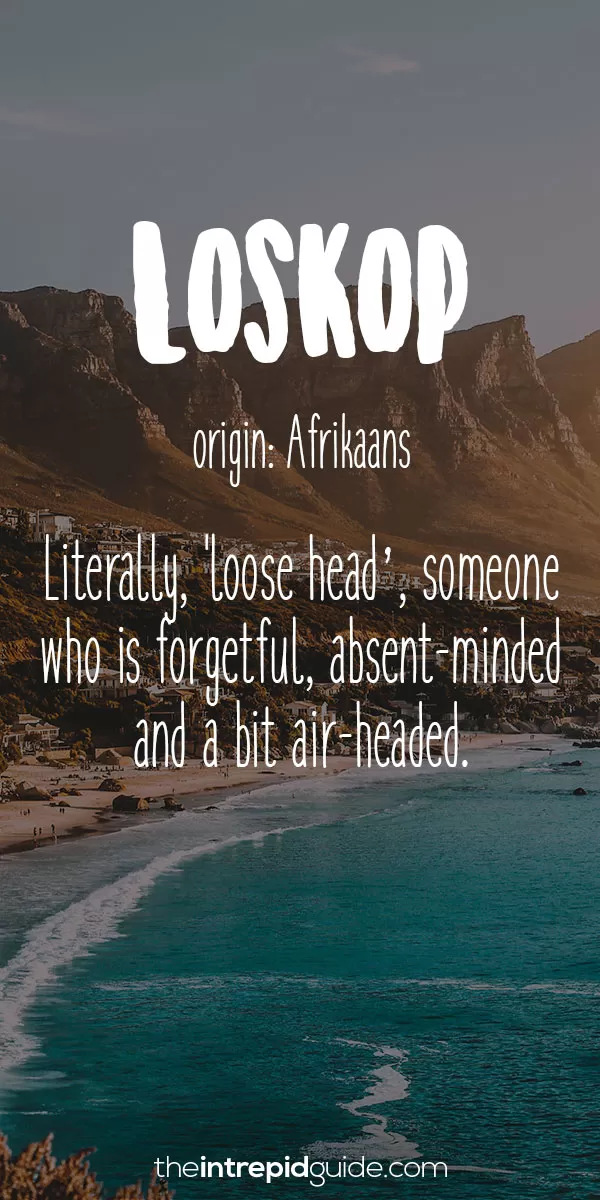
Learn Afrikaans for travel! Get my free Afrikaans travel phrase guide here.
Albanian
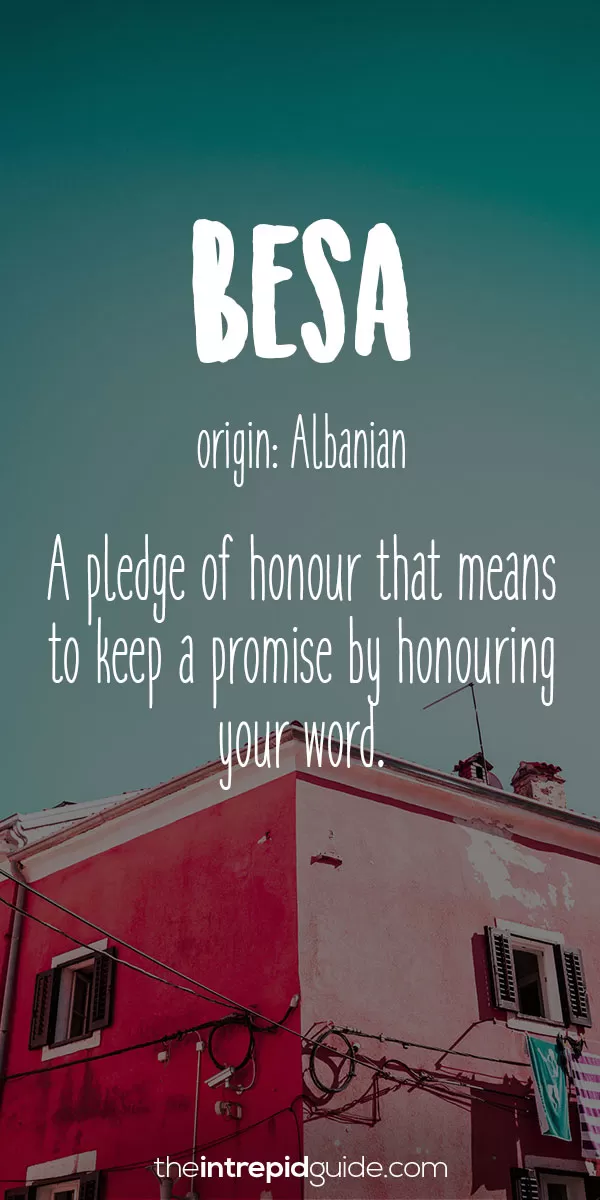
Arabic

Taarradhin (تراض) – Taarradhin is the act of coming to a happy compromise where everyone wins. It’s a way of reconciling without anyone losing face.

Learn Arabic for travel! Get my free Arabic travel phrase guide here.
Basque
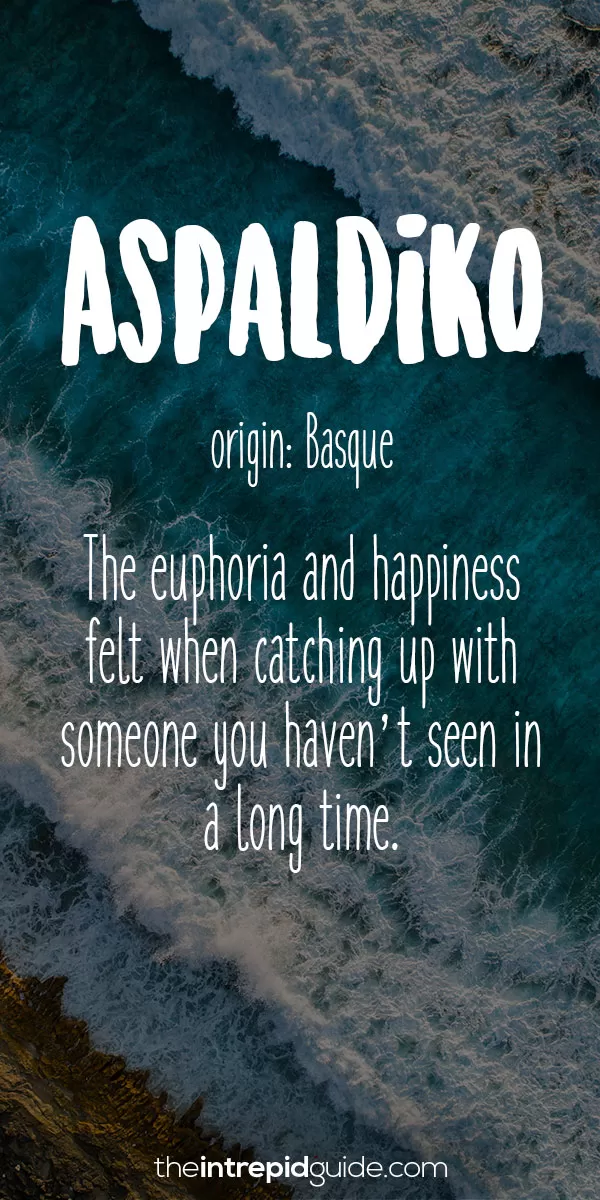
Learn Basque for travel! Get my free Basque travel phrase guide here.
Bengali

Bulgarian
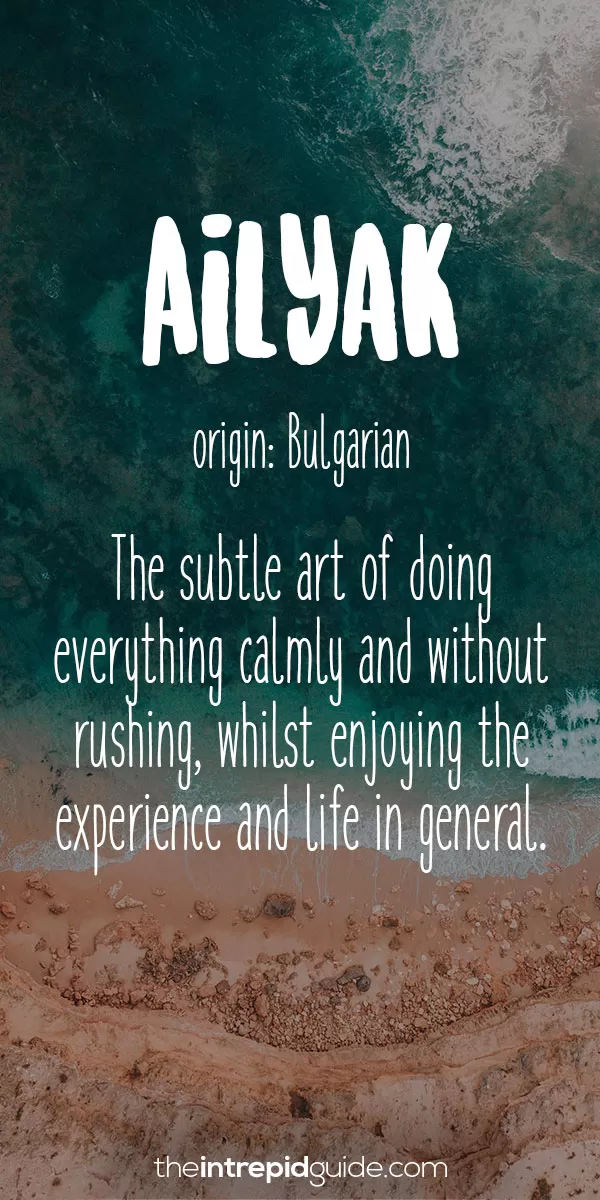
Learn Bulgarian for travel! Get my free Bulgarian travel phrase guide here.
Chinese (Mandarin)
Guanxi (关系) – Pronounced [gwan-shee], guanxi is often translated as ‘connections’, ‘relationships’ or ‘networks’ and refers to having a strong personal relationship with someone which involves moral obligations and exchanging favours. This is one of the essential ways of getting things done in traditional Chinese society. To build up good guanxi, you do things for people such as give them gifts, take them to dinner, or other favours. If you need to call in a favour then you ‘use up’ your guanxi.
Once a favour is made, an unspoken obligation exists. Because of this, people often try to refuse gifts, because, sooner or later, they may have to repay the debt. However, the bond of guanxi rarely ends, because once the relationship exists, it sets up an endless loop that can last a lifetime.

Czech
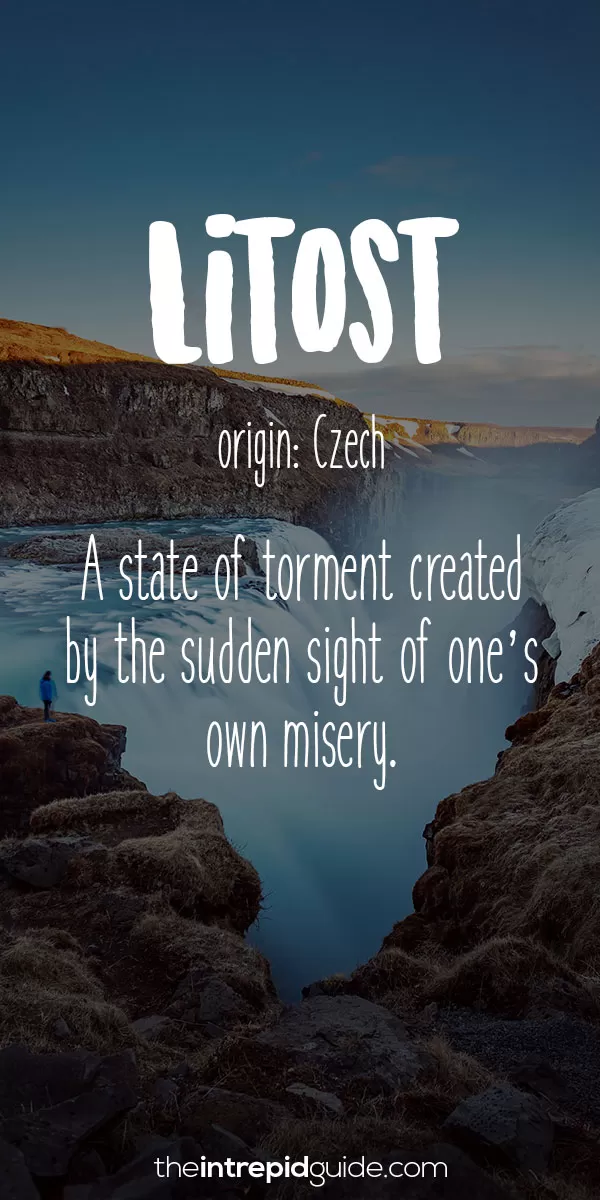
Mít kliku – This Czech verb means to have luck on your side or be lucky enough to achieve something. It literally means, ‘to have a door handle’.
Prozvonit – Prozvonitis when you call but only let it ring once so that the other person calls back without so you save money or minutes.
Learn Czech for travel! Get my free Czech travel phrase guide here.
Danish


Learn Danish for travel! Get my free Danish travel phrase guide here.
Dutch

Voorpret – Voorpret is the build up of anticipation, joy or pleasure you feel ahead of the actual event such as setting up for a party and can’t help but dance as you do it. Voorpret literally means, ‘pre-fun’ but means more than just the anticipation of something fun, it’s enjoying the anticipation. It’s voorpret!
Gezelligheid – This Dutch word combines the Danish concept of hygge and the German gemütlichkeit. Gezelligheid is the idea of being in a comfortable, cozy atmosphere with loved ones, catching up with an old friend, or just the general togetherness that gives people a warm feeling. It suggests a sense of closeness that many consider encompasses the heart of Dutch culture.
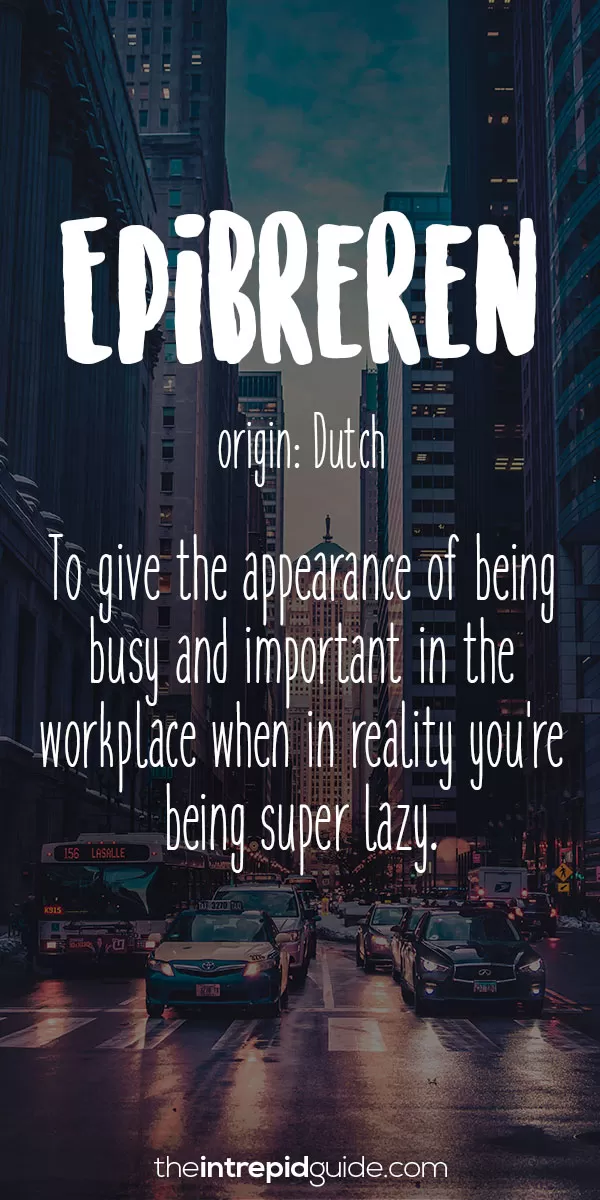
Learn Dutch for travel! Get my free Dutch travel phrase guide here.
Estonian

Finnish

Jaksaa – A severe absence of enthusiasm to do something. When you just don’t have enough strength, will power to do something or can’t be bothered.
Kaamos — Kaamos is more than just Polar Night when there are 24 consecutive hours of darkness, kaamos describes the longing for sunshine, and a feeling of depression and lack of motivation and enthusiasm. It signifies long dark days and bad weather, no social life, and a lack of inspiration.
Lieko – A trunk of a tree that has submerged to the bottom of a lake.
Myötähäpeä – Experiencing a shared embarrassment or shame when seeing someone else do something embarrassing. Myö means ‘we,’ myötä means ‘with’ and häpeä is ‘shame’, so it can be roughly translated to something like ‘co-embarrassment’ or ‘secondhand embarrassment’.

Sauna – A sauna is a small room used as a hot-air or steam bath for cleaning and refreshing the body. Saunas were invented in Finland several millennia ago and are still a cornerstone of Finnish culture, as well as of every Finnish home. So much so that, traditionally, when people moved they used to build the sauna first, and only then the house.
Sisu – Sisu is a Finnish concept that describes a stoic resilience, determination and hardiness considered to be necessary to face the difficulties of life in general and of life in harsh conditions in particular. This Finnish term that can be roughly translated as strength of will, determination, perseverance, and acting rationally in the face of adversity. Sisu isn’t momentary courage, but the power to sustain that courage to see something through.
Tokka – Pronounced [talk-uh] is a Finnish collective noun for a large herd of reindeer. It is said that there are as many reindeer as there are people in Finland.
Learn Finnish for travel! Get my free Finnish travel phrase guide here.
French
Bérézina – A sense of panic associated with a huge defeat. The word Bérézina is used in the French idom ‘C’est la Bérézina’ meaning a complete defeat, loss. The origin of this expression dates back over 200 years to the banks of the river Berezina in Belarus. It was here that a fierce battle took place between Napoleon’s retreating army and the Imperial Russian army. The battle ended in a victory for the Russian Empire and heavy losses for the French.
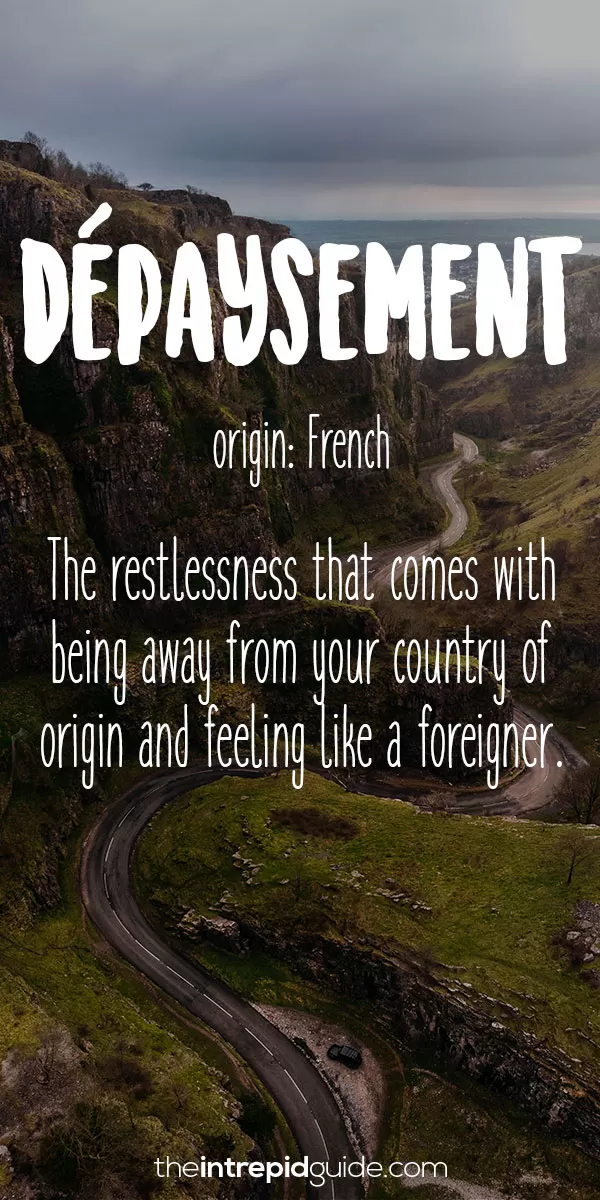
Bricoleur — A bricoleur is a handyman who uses whatever materials he can get his hands on to create a construction (or bricolage). Think of the well-known term Bric-à-brac – miscellaneous objects and ornaments of little value. The closest equivalent in English would be something like a DIY-er.

La douleur exquise – If French is the language of love, then it seems only fitting that it has a term to describe all the feelings associated with unrequited love. La douleur exquise literally means ‘the exquisite pain’, the pain of wanting something you can’t have, such as someone who will never return your feelings.
L’appel du vide – L’appel du vide is that little voice in your head telling you to do something stupid like jerking the steering wheel to the right and take a flying leap off the edge or staring out at the view from a balcony and have a sudden urge to jump over the ledge. In English, you might refer to it as the call of the Siren song.
L’esprit de l’escalier – Literally ‘stairwell wit’, l’esprit de l’escalier is the feeling that you’ve got the perfect comeback, but you think of it too late. Similar to the German, treppenwitz, mentioned earlier.
Retrouvailles – This beautiful French word means ‘refindings’, referring to the reunion you would have with someone you care deeply for but haven’t seen in a long time. The English word ‘reunion’ doesn’t quite capture this intense feeling.
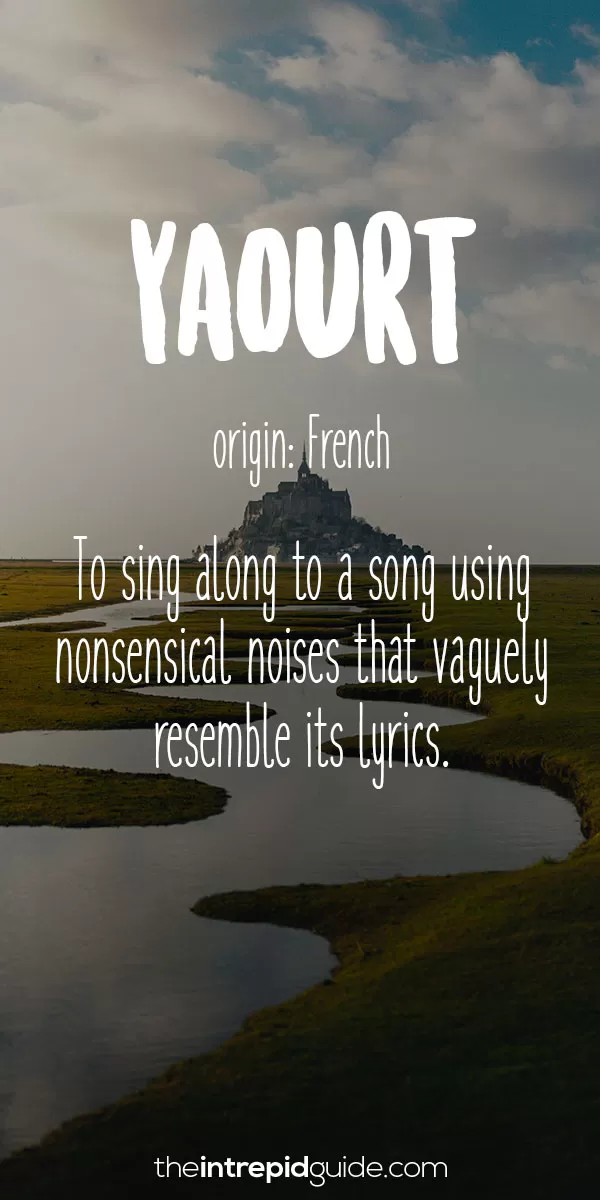
Learn French for travel! Get my free French travel phrase guide here.
Georgian

German
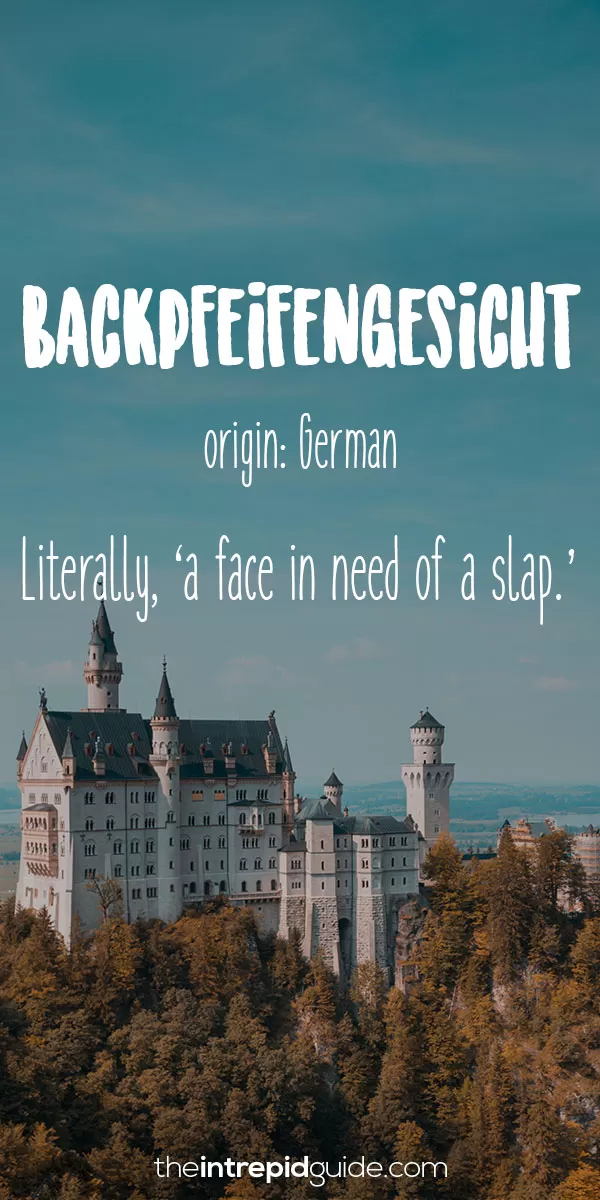
Drachenfutter – Literally, ‘dragon fodder’, this is a gift someone gives to placate and apologise to someone, especially a spouse, after they’ve done something wrong or stupid.
Erklärungsnot – The urgent need to explain something, either yourself or the situation. It can also mean to struggle explaining something. Erklärungsnot is made up of the German words Erklärung (‘explanation’) and not (in this case, can be translated as ‘need.’)
Extrawunsch – A term used to call someone who complicates things by being fussy or picky, and thus slows things down.
Fachidiot – Fachidiot, literally it means ‘subject-idiot’. A fachidiot is a person with expert knowledge in their own field and are well-accomplished but are clueless when it comes to anything outside that area.


Fisselig – This represents a temporary state of sloppiness, usually elicited by a person’s nagging. This often means that a person is flustered to the point of incompetence.
Kabelsalat – Kabelsalat literally means, ‘a cable salad’, a beautiful word to describe the mess of tangled cables.
Handschuhschneeballwerfer – Handschuhschneeballwerfer is German slang for ‘coward’. It literally means, ‘someone who wears gloves to throw snowballs’. In other words, a cowardly person who criticises and abuses something from a safe distance.
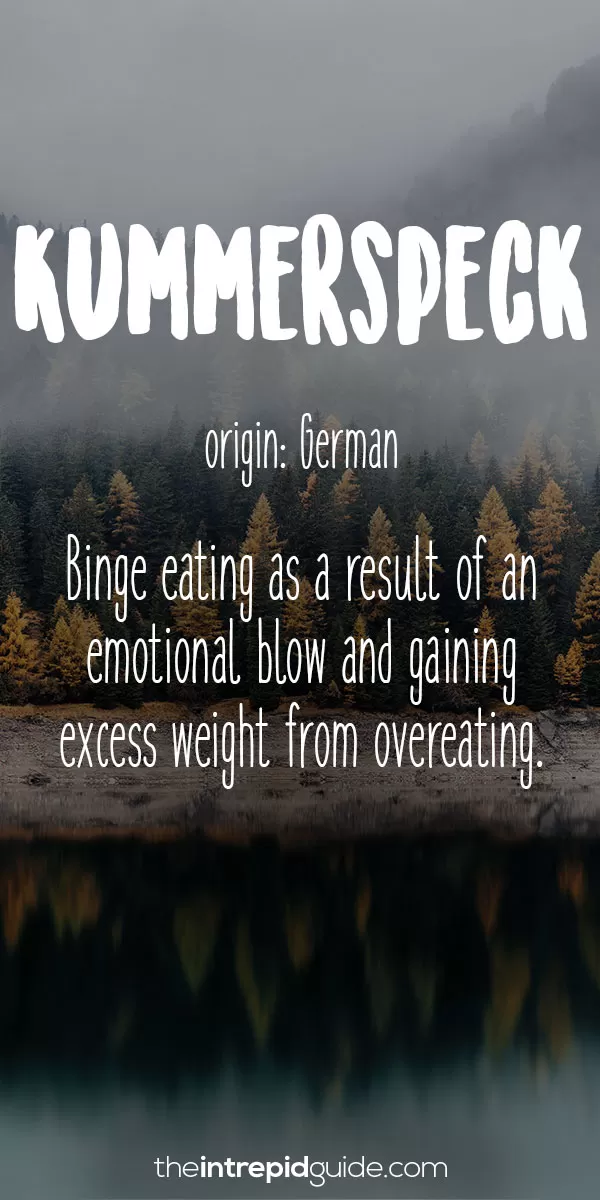
Lebensmüde – Lebensmüde is a German compound noun made up of the words leben (life) and müde (tired), and literally means ‘life tired’. It describes the feeling of being tired or weary of life. Its closest English equivalents are probably world-weary, depressed, fed up, restless and dissatisfied.
Schadenfreude – A feeling of joy and pleasure that comes with seeing another’s misfortune. Usually. someone you really dislike.
Schilderwald – A street that is so overcrowded and rammed with street signs, that you’re more prone to getting lost rather than finding your way.
Schlimmbesserung – Something that was meant to be an improvement, but actually makes things worse.
Schnapsidee – Literally, ‘schnapps idea’, is a plan so ridiculous you must have been drunk when you thought it up.

Torschlusspanik – This beautiful word is used to refer to the feeling you experience at a certain point in your life where you see an imaginary door closing on all your opportunities, and you wonder what could have been. Tor means ‘gate,’ schluss means ‘closing’ or ‘ending,’ and panik means, ‘panic.’ So, torschlusspanik literally translates to ‘gate closing panic.’
Treppenwitz – Possibly the most useful untranslatable word on this list, treppenwitz describes all the things you should have said in the heat of the moment but only think of when it is too late. Also known as, the best comeback line you never said.
Waldeinsamkeit – The feeling of being alone in the woods. Derived from two German words ‘wald,’ meaning forest, and ‘einsamkeit,’ meaning loneliness, it refers to a connectedness with nature and the peace experienced in that moment.
Weichei – Weichei is a German slang term which used to refer to a cowardly person. Literally meaning ‘a soft egg’, the closest English equivalent would be ‘wimp’.
Weltschmerz – The literal translation of the word is ‘world grief’, or ‘world-pain’, a term first coined by the German author Jean Paul. Weltschmerz refers to a deep sadness about the imperfection and pain of the world.
Verschlimmbessern – Verschlimmbessern describes the act of trying to make something better, only to end up making it worse than it initially was. In English, you might say something like ‘to put your foot in it’.
Learn German for travel! Get my free German travel phrase guide here.
Greek
Filotimo (φιλότιμο) – Filotimo is almost impossible to translate but can be summed up as ‘love of honour’. It describes a person who understands the responsibility to themselves, as a human, being to always do the right thing and with honour. Even if their wealth, safety, freedom, or even life is at peril. No matter what, this person will do the honourable thing, regardless of the consequence.
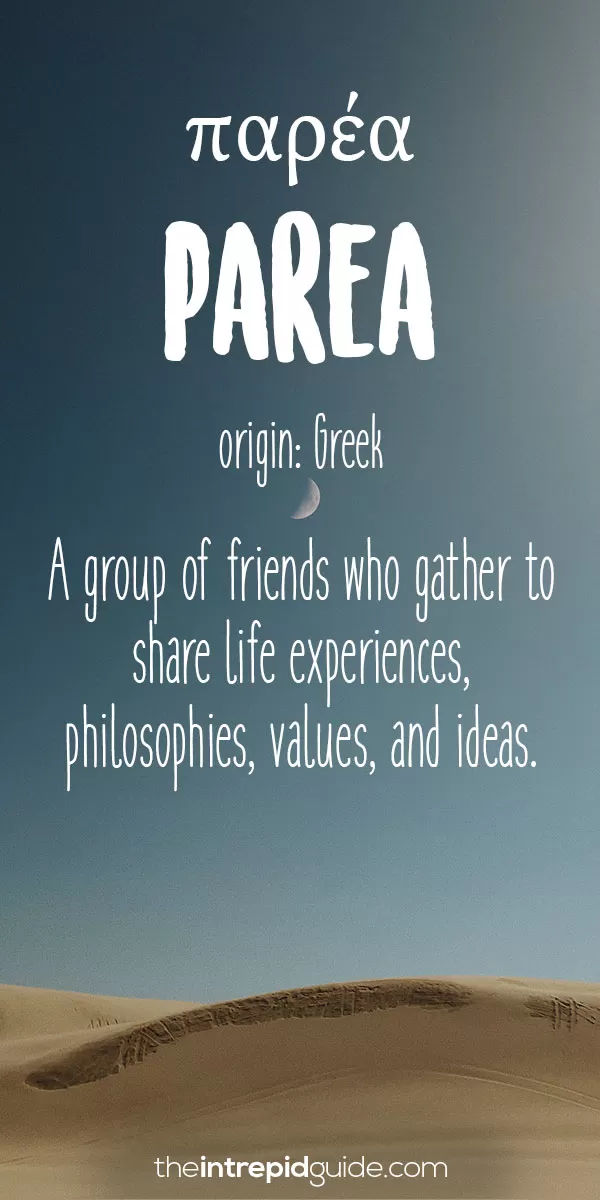
Psithurism (Ψυθισμός) – Psithurism is the rustling sound of leaves in the wind. It comes from the Greek psithuros, meaning ‘whispering, slanderous.’
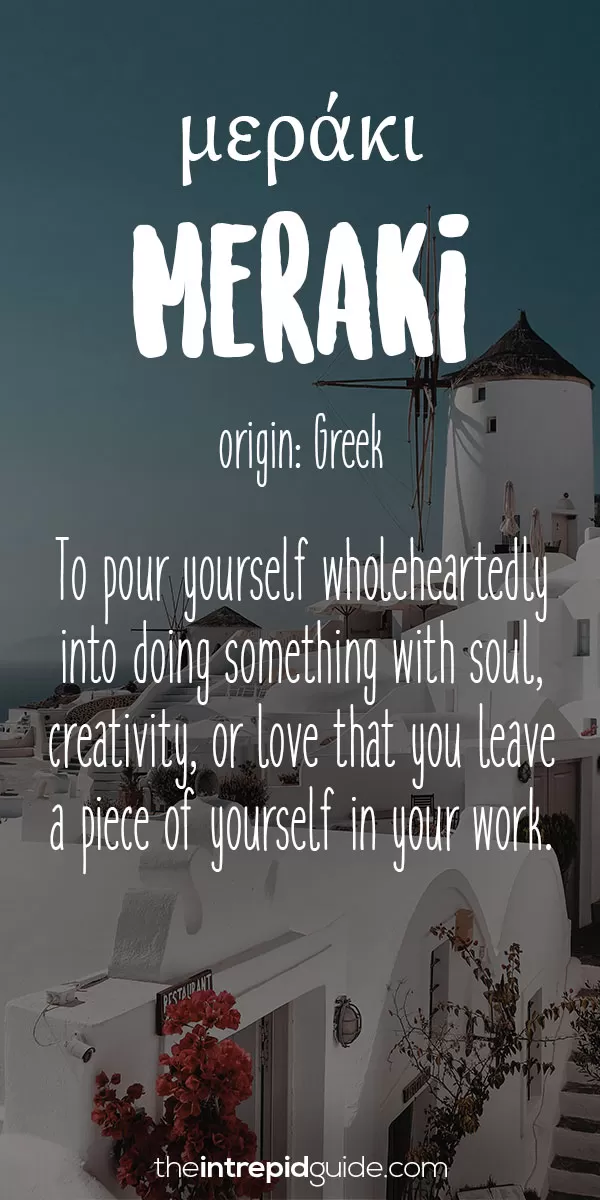
Learn Greek for travel! Get my free Greek travel phrase guide here.
Hawaiian

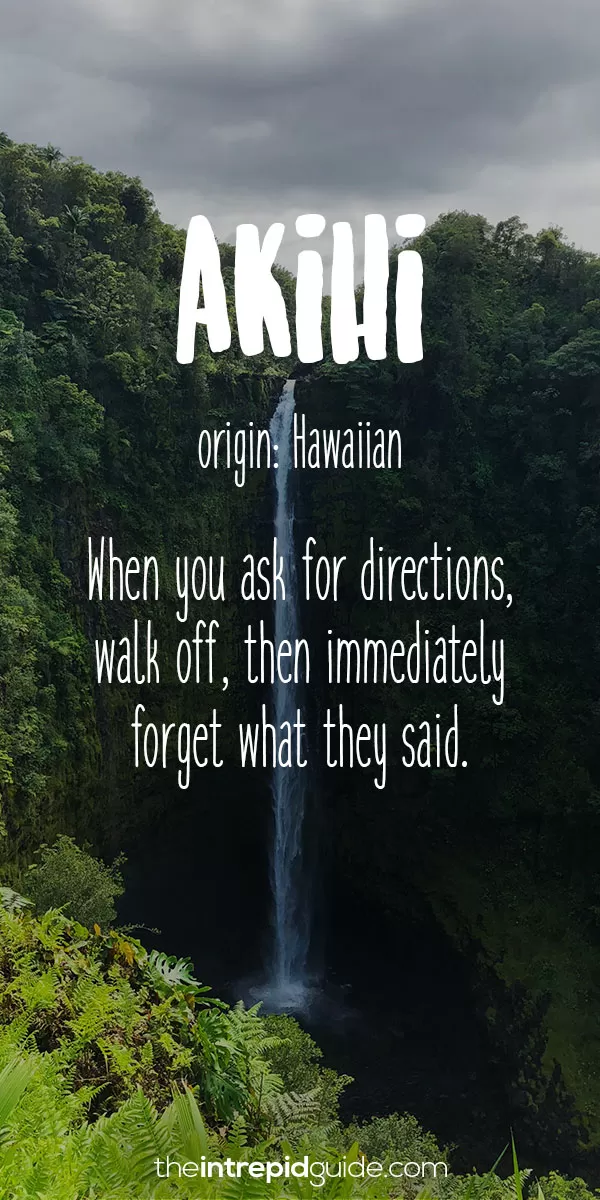
Hebrew

Learn Hebrew for travel! Get my free Hebrew travel phrase guide here.
Hindi
Chai-Pani (चाय पानी)– The phrase ‘Chai-Pani’ literally meaning, ‘tea and water’, is used to offer welcome drinks and facilitate guests in houses of India. It can also refer to a bribe given to someone, often a bureaucratic worker, to get a job done quickly.


Viraha (विरह) – Realising you love someone only after you’re separated.
Learn Hindi for travel! Get my free Hindi travel phrase guide here.
Hungarian
Elmosolyodni – A kind of smile that forms when something isn’t especially funny, but you can’t help but smile anyway.
Házisárkány – A nickname for your spouse or better half who is constantly nagging. It literally means an ‘Domestic Dragon’
Icelandic
Dalalæða – A low waist-deep fog that forms after a warm and sunny day. It literally means, ‘a fog that sneaks up from the bottom of a valley’ or ‘valley-sneak.’

Þetta reddast – Pronounced [THETTA red-ahst], Þetta reddast is Iceland’s unofficial motto that loosely translates as ‘everything will work out in the end’.
Tima – Being unwilling to spend time or money on a particular thing, even though you can afford it.
Learn Icelandic for travel! Get my free Icelandic travel phrase guide here.
Indonesian
Jayus – A joke so terrible and unfunny that you can’t help but laugh. It’s funny because it’s not funny, kind of like a dad joke.
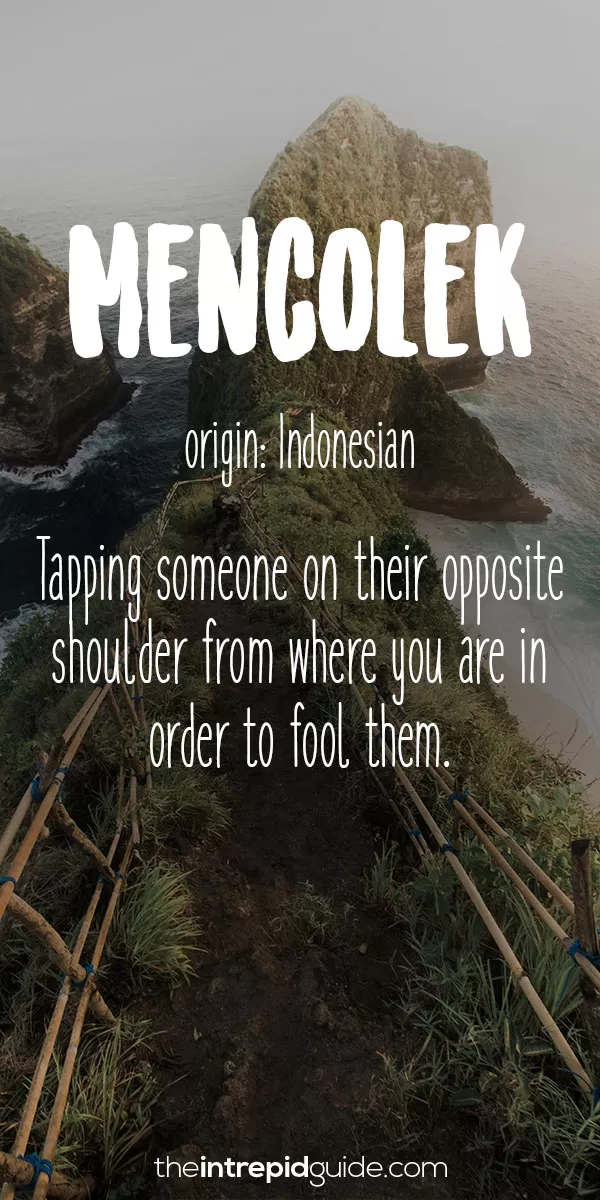
Inuit
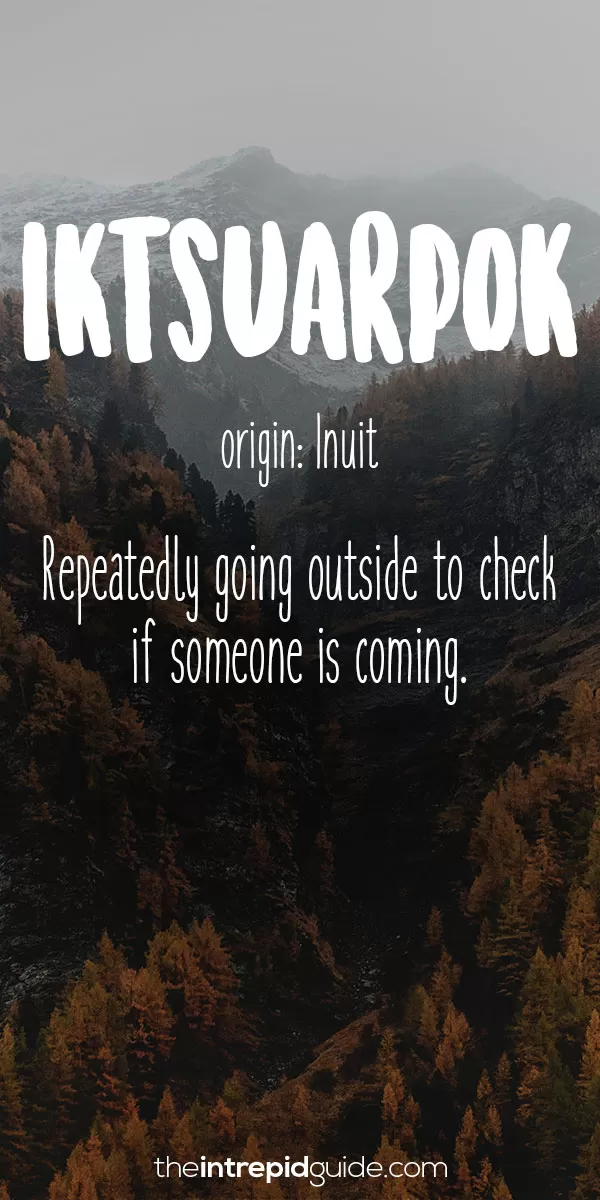
Irish
Cúbóg – A batch of Easter eggs.
Learn Irish for travel! Get my free Irish travel phrase guide here.
Italian

Attaccabottoni – Literally, ‘attach buttons’, an attaccabottoni is a chatty person who corners you to tell you long, meaningless stories, in endless detail about their life.
Cavoli riscaldati – Literally reheated cabbage, this is essentially an attempt to reheat an old romance. In other parts of Italy, ‘minestra riscaldata‘ or ‘zuppa riscaldata’, meaning reheated soup, is used to describe the same sentiment.
Commovente – Often translated as ‘heartwarming,’ but it directly refers to being moved to tears. The verb commuovere means to move, to touch, to stir emotions.
Culaccino – Culaccino refers to the dregs in a glass but also the residue or water ring left on a surface by a moist, cold glass or other small container. In Italian, ‘culo‘ means bottom.
Gattara – A woman devoted to caring for and feeding stray or domestic cats. A more extreme version of a cat lover.
Fare la scarpetta – To finish up the contents of your plate, especially the sauce, with a piece of bread.

Learn Italian for travel! Get my free Italian travel phrase guide here.
Japanese
Age-otori (上げ劣り) – Pronounced [aah-gey-oh-toh-ree], Age-otori is a beautiful Japanese word that perfectly sums up a disaster haircut that makes you look worse than before.
Arigata-meiwaku (ありがためいわく) – This is used to refer to an act that someone does for you, even though you didn’t want to have them do it and tried to avoid having them do. They might have gone ahead, determined to do you a favour, then things going wrong, causing you a lot of trouble. In spite of this, social conventions required you to still express gratitude. What a mouthful! Yet the Japanese have a simple concise term that says it all in just 2 words, arigata-meiwaku.
Bakku-shan (バックシャン) – This dating slang term literally means ‘back beautiful’ and is used to describe a girl who is beautiful, as long as you’re looking at her from behind! Harsh! An English equivalent could be either ‘good from afar, but far from good’, or ‘Butter face’ – where everything but her face is attractive). What makes this Japanese word so interesting is that it’s not Japanese at all, it’s a composite of バック (bakku, ‘back’, from English back) and シャン (shan, ‘beautiful’, from German schön).
Boketto (ぼけっと) – Gazing vacantly into the distance without thinking of anything specific, in other words, daydreaming.
Chindōgu (珍道具) – A prank originating from Japan, which is done by a person seemingly inventing ingenious everyday gadgets that seem like an ideal solution to a particular problem, but are in fact nothing more than a useless gag. Literally translated, chindōgu means unusual (珍, chin) tool (道具, dōgu).

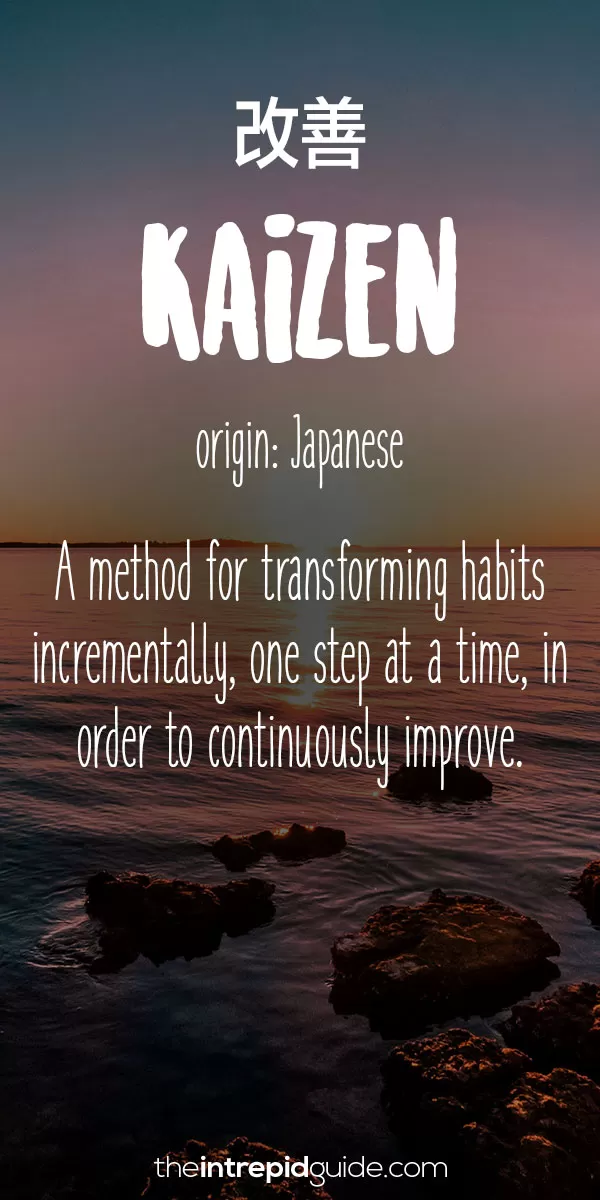


Kyōiku mama (教育ママ) – Pronounced [ky-oh-ee-kuu-mama], Kyōiku mama is an offensive Japanese term used to describe a mother who relentlessly pushes her children to achieve academic excellence. It literally translates to ‘education mother’.
Mono no aware (物の哀れ) – Literally ‘the pathos of things’, and also translated as ‘an empathy toward things’. The term Mono no aware was coined by Motoori Norinaga, an eighteenth century literary scholar, who combined aware, which means sensitivity or sadness, and mono, which means ‘things.’ Norinaga believed that this feeling was at the very centre of Japanese culture.
Nekama (ネカマ) – Nekama refers to a certain type of male, who in their normal daily life are usually heterosexual, however, online they represent themselves as female. Thus, this term commonly refers to a man pretending to be a woman on the internet, regardless of his sexuality.
Shouganai (しょうがない) – A Japanese philosophy that states that if something is meant to be and cannot be controlled, then why worry about it? The idea is that worrying won’t prevent the bad things from happening; it will only deprive you of the joy of enjoying the good things in life. Translated literally, shouganai means ‘it can’t be helped’.
Tatemae (建前) and Honne (本音) – Tatemae has the specific cultural meaning. It refers to the behaviour that Japanese people adopt in public, according to what is socially accepted or not by Japanese society. It could be translated as the ‘public facade’. Privately held views that you would never admit in public is called honne.
Tsundoku (積ん読) – How many times have you bought a book but never read it? This is called tsundoku, a beautiful word used to describe the act of buying books but letting them pile without ever reading them. The term originated in the Meiji era (1868–1912) as Japanese slang. The word consists of tsunde-oku (積んでおく, to pile things up ready for later and leave) and dokusho (読書, reading books). It is also used to refer to books ready for reading later when they are on a bookshelf.
Wabi-Sabi (侘寂) – This is a beautiful Japanese concept that represents finding beauty in imperfections. It allows us to accept that growth and decay are a natural process. In traditional Japanese aesthetics, wabi-sabi is a world view centered on the acceptance of transience and imperfection. Wabi-sabi is a concept derived from the Buddhist teaching of the three marks of existence (三法印, sanbōin), specifically impermanence (無常, mujō), suffering (苦, ku) and emptiness or absence of self-nature (空, kū).
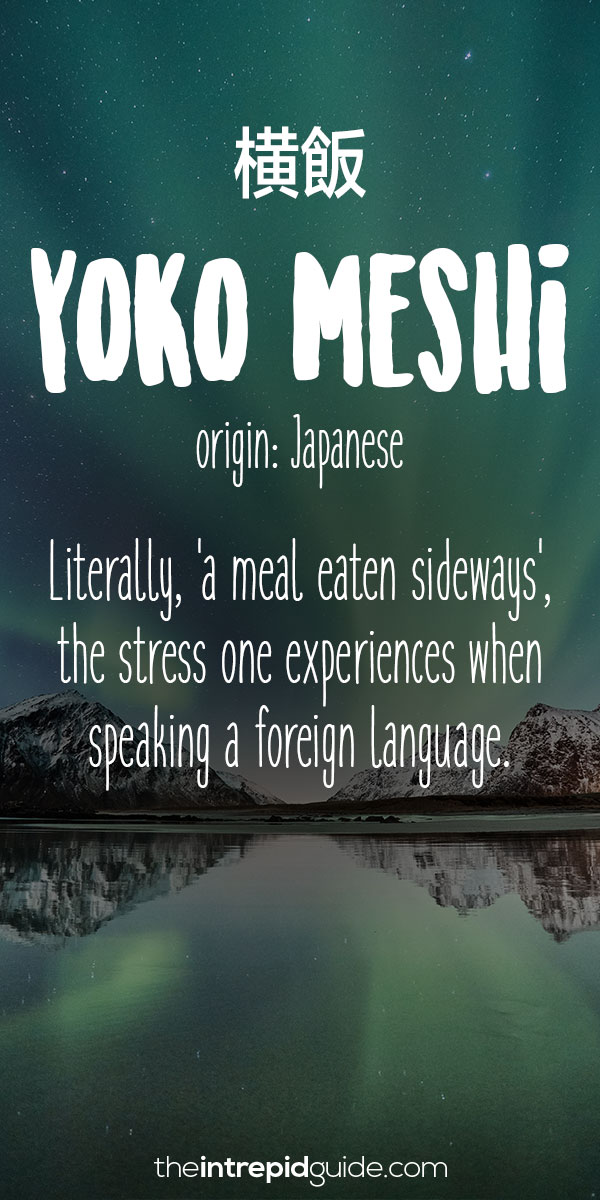
Yūgen (幽玄) – Yūgen is an important concept in traditional Japanese aesthetics. It refers to the sad beauty associated with human suffering, coupled with a sense of profound mysterious sense and beauty of the universe.
Related: 69 Wonderful Japanese Expressions That Will Brighten Your Day
Kivila
Mokita – From the Kivila language native to Papua New Guinea, mokita is a commonly known truth that no one wants to admit or talk about.
Korean
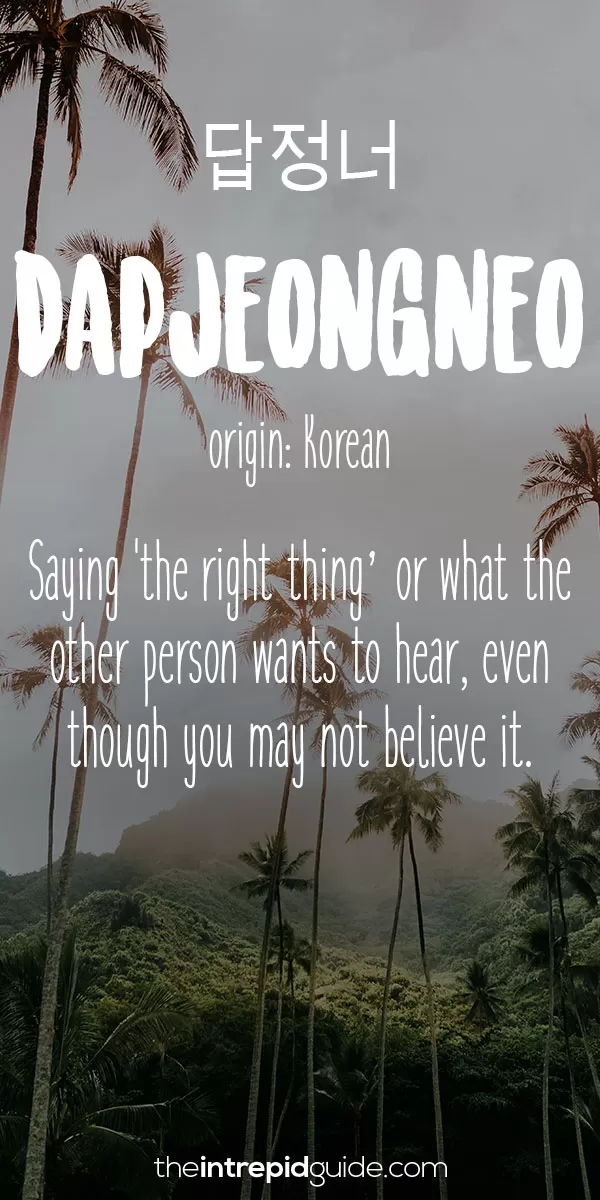
Gosohada (고소하다) – The feeling you get when someone finally gets what they deserves. When you think to yourself ‘HA serves you right!’, that’s Gosohada.
Gilchi (길치) – What you call someone who has a terrible sense of direction and who constantly gets lost.
Hyo – Pronounced [hee-yo], this is both a name meaning ‘dutiful’ and a term to describe the sense of duty children have towards their parents and the expectation that they may need to make sacrifices for them out of respect.
Latvian
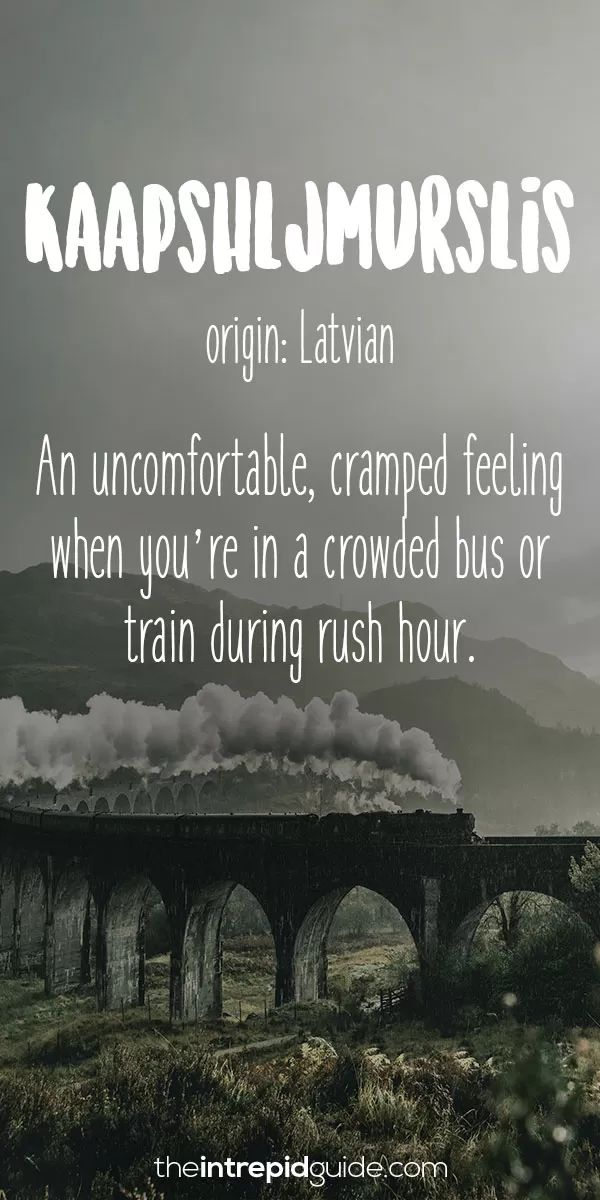
Lithuanian
Nepakartojama – A never-to-be-repeated perfect situation. Directly translated, it means ‘unable to repeat’
Malay
Manja – Manja is a person who shows so much outward love and affection towards someone they care about, like a spouse, partner, or child, to the point where they are pampering or spoiling them

Māori (Cook Islands Maori)
Papakata – To have one leg shorter than the other.
Norwegian
Dugnad – Is a type of community day where Norwegians get together to help clean up their neighbourhoods by fixing, cleaning, painting or just tidying things up. A dugnad takes place around the change in seasons. Every Norwegian has participated in a dugnad. It’s a great occasion to socialise with your neighbours, which – if you live in Norway – you will know is pretty rare. The added benefit is that a dugnad is usually accompanied by kaffe og kaker (coffee and cakes).

Pålegg – Anything that you can put on top of open-faced sandwiches, such as brun øst (Norwegian Cheese) cold cute, tomatoes, lettuce, spreads or other topping.

Uffda! / Uff da! – Is a versatile interjection and expression which basically means ‘Oh, I’m sorry to hear that’. It expresses surprise, astonishment, exhaustion, relief, and can be used to express empathy. It means a combination of ‘Ouch for you!’ and ‘I’m so sorry that you hurt yourself’. Within Scandinavian-American culture, Uff da often translates to, ‘I am overwhelmed’.
Yr – Yr can only be described as a very specific kind of rainfall with tiny, almost floating raindrops (or snowflakes). It’s similar to drizzle or mist but one as one Norwegian puts it ‘It paints a picture not only in how it’s spelled but how it’s said, it’s more a sound than a word. Also when conjugated: ‘det yrer litt‘. I see foggy whispers of misty rain in the fjords.’ (Source). I think this is the most beautiful untranslatable word I’ve learned so far since learning Norwegian.
Learn Norwegian for travel! Get my free Norwegian travel phrase guide here.
Pascuense (Easter Island)
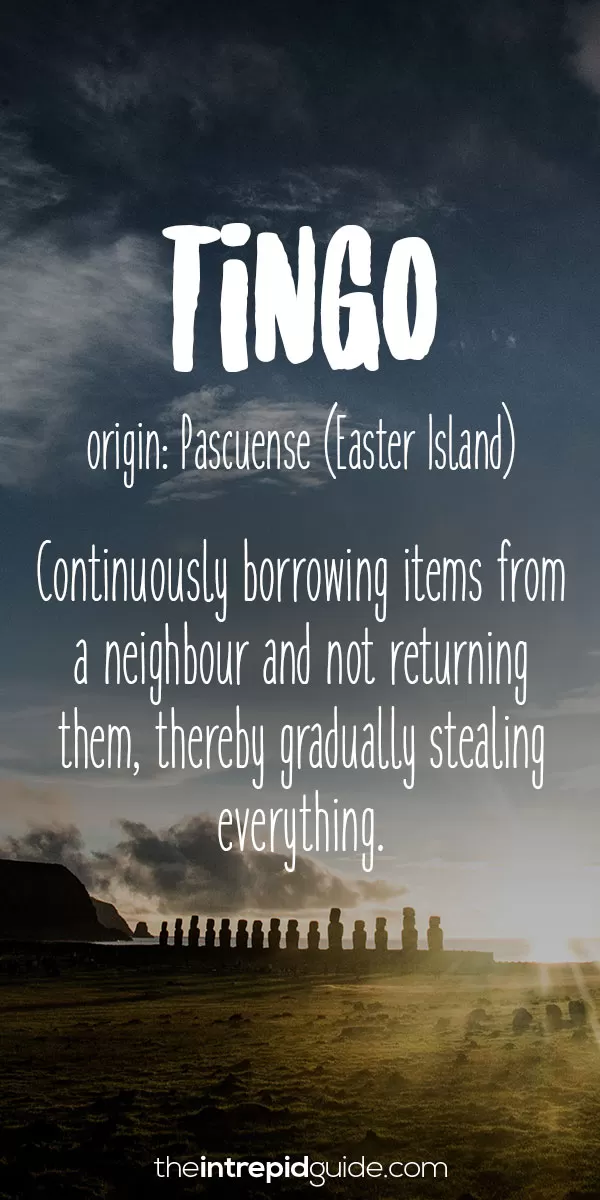
Persian
Zhaghzhagh – Pronounced [zhaang-zhaah-gh], it’s the uncontrollable chattering of teeth, either due to the cold, or from intense rage.
Polish
Dożywocie – A contract between parents and children, guaranteeing lifetime care in exchange for real estate.
Formacja – Formacja is used in colloquial speech to describe a state of mind that is widespread across a particular generation or period of time. The closest English word would be ‘zeitgeist’.
Kilkanaście – This Polish word refers specifically to any number between 12 and 19 and is used in a similar way as the English ‘umpteen’ or ‘many’, but neither translation is quite correct.
Kombinować – To make something or try to resolve a problem with the bare minimum and in an unusual way. This could be as a result of having limited access to resources or knowledge.
Radioukacz – Telegraphists who were part of the resistance movements on the Soviet side of the Iron Curtain.
Zalatwic – Zalatwic means ‘to get done’, but in a very specific way and is often either illegal or bends the rules. It involves using a bribe, political clout or connections, or simply personal charm to get the job done. This was especially common in Poland during the days of communism in Poland where it was probably impossible to live without ‘zalatwic’.
Portuguese
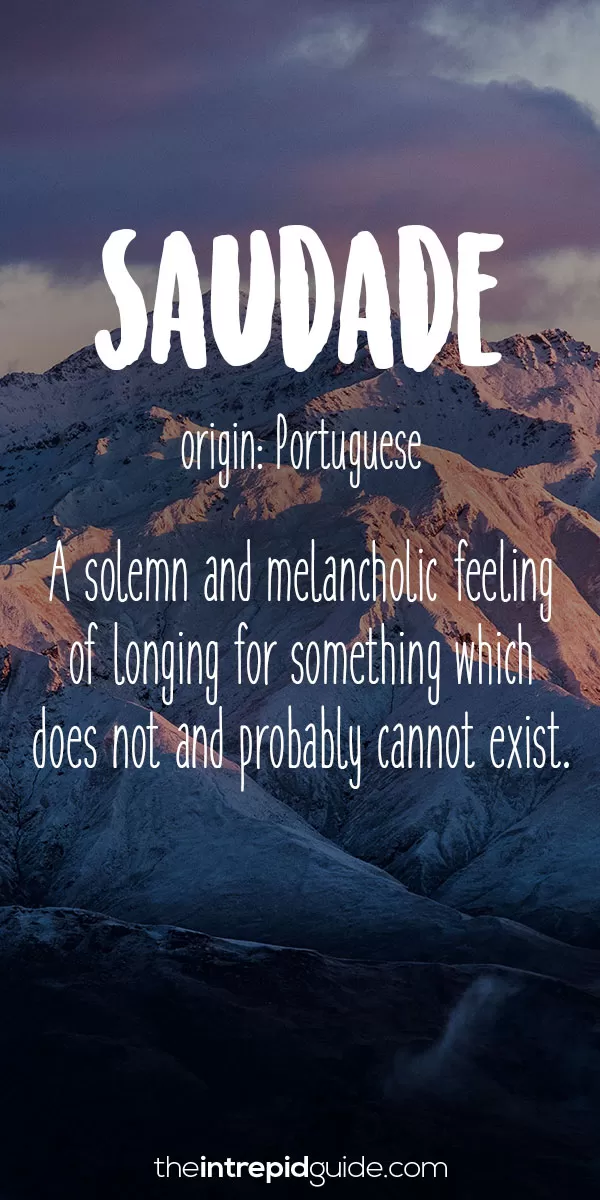
Desenrascanço – Desenrascanço literally means ‘disentanglement’, a term used in Portugal to describe the act of ‘disentangling’ oneself from a difficult situation by using all available means to solve the problem.

Learn Portuguese for travel! Get my free Portuguese travel phrase guide here.
Romanian
Dor – A sad longing or yearning for someone.
Soare cu Dinti – When you look out the window and it looks lovely and sunny until you actually step outside. Soare cu Dinti describes a beautiful sunny, but very cold day.
Rukwangali (Namibia)
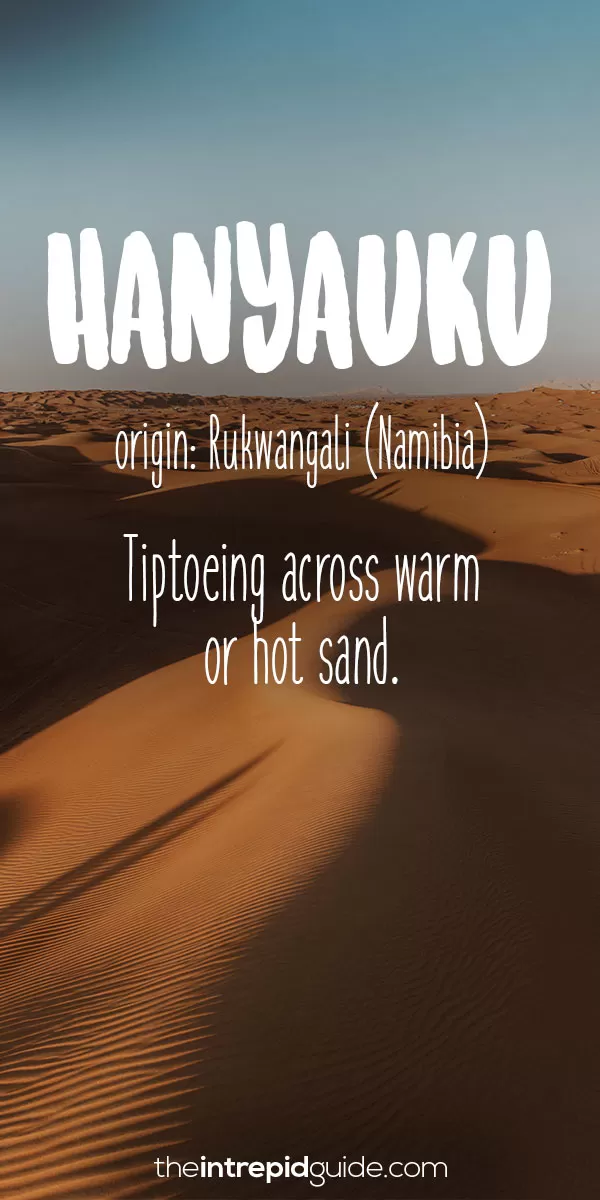
Russian
Listopad (листопа́дъ) – The falling of leaves.
Odnoliub (однолюб) – Someone that only has one love in their life or is only capable of a single person at a time.
Pochemuchka (почемучка) – Pochemuchka is a person, usually a child, who asks too many questions. Pronounced [POH-chay-MOO-chka[, it comes from the Russian word pocemu [POH-chay-MUH], which means ‘Why?.’ Pochemuchka was first used in a popular Soviet-era children’s book whose boy hero was given the nickname Alyosha Pochemuchka because he was never satisfied with the answers he got. Pochemuchka is a light-hearted put-down that might be expressed in English with a warning like ‘curiosity killed the cat’.
Razljubit (разлюбить) – Razljubit is the opposite feeling of the Norwegian forelsket when you first fall in love. It’s the feeling you have towards someone you were once in love with. When you see or think of them, you may feel a twinge of affection, but by now it’s totally platonic. That’s razljubit.
Toska (тоска) – Toska is the feeling of anguish, sadness, or melancholia, even though there’s no specific cause. Often spiritual in nature, this is a deep sadness that touches the soul.
Zapoi (Запой) – Zapoi describes being drunk for several days and waking up in an unexpected place that you don’t recognize.
Zloradstvovat (злорадствовать) – Zloradstvovat means to be devilishly happy’, in the evil way, when seeing someone’s misfortune, pain, or loss.
Learning Russian? Check out these hilarious Russian idioms and expressions
Samoan
Faamiti – Pronounced [fah-mih-tee], faamiti is a high-pitched noise made by sucking air through tightly-sealed lips in order to attract the attention of a pet or children.
Scottish

Suilk – Pronounced [swilk], this Scottish word means to make an abnormal amount of noise whilst such as to swallow, gulp, or suck with a slobbering noise. Suilk is now used in English and even has English verb conjugations, ‘suilking‘ is the act, and a ‘suilker‘ is one who suilks.
Tartle – The moment where you hesitate when introducing someone because you’ve just forgotten their name. You’ve just tartled, so you say, ‘Pardon my tartle!’
Learn Scots for travel! Get my free Scots travel phrase guide here.
Serbian
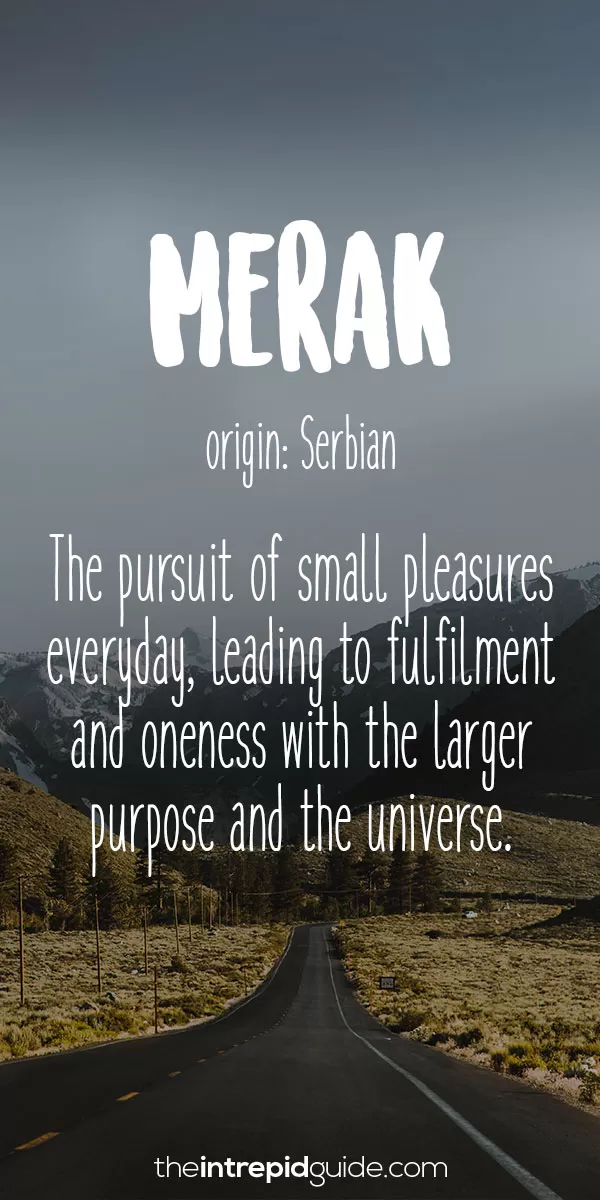
Slovenian
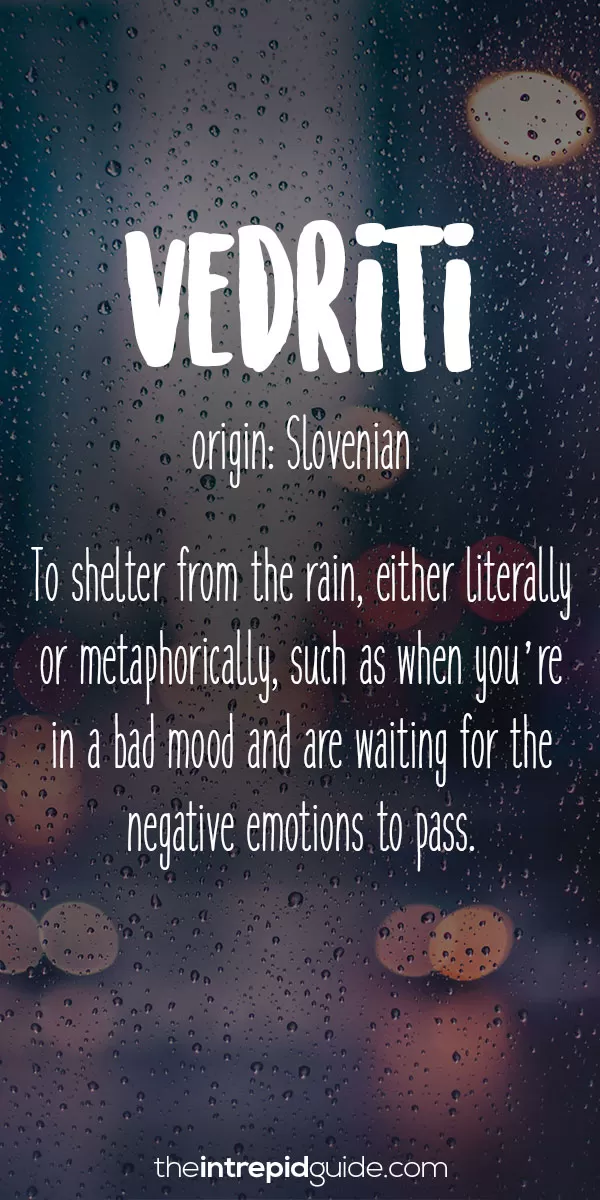
Spregledati – To simultaneously understand someone on a deeper level, whilst also overlooking it.
Spanish
Anteayer – This single word means ‘the day before yesterday’. Anteayer is made up of the Spanish word ante, meaning before or in front of, and ayer, meaning yesterday. In some parts of Latin America and rural Spain, antier is used instead.
Chingada – Chingada is a vulgar term commonly used in colloquial Mexican Spanish that shouldn’t be thrown around lightly. It can either refer to a special kind of hellish place that’s far away, where you send anyone who irritates you, like when you say ‘go to Hell’, or can be used as a variation of the f-word. Chingada stems from the verb chingar which means to ruin, annihilate, screw or f**k. Like I said, be careful how you use it, if at all!
Desvelado – While the Spanish are known for their siestas, they also have a word which means the complete opposite. Desvelado literally means ‘awake’ and comes from the verb desvelar, which means ‘to reveal’ or ‘to keep awake’. It can also be translated into English as being wide awake, unable to sleep, or sleepless.
Duende – The word duende has two distinct meanings. The term derives from ‘duen de casa‘ (master of the house), referring to a magical, mythical creature or spirit such as an elf, leprechaun, or even a goblin found in Spanish and Latin American folklore. The second, and more interesting and beautiful definition, describes the heightened state of emotion, expression, and expression that a performer gives off that draws in the audience. Duende or tener duende (‘to have duende’) is a Spanish term that is traditionally connected with flamenco and other activities that evoke Spanish fiery passion, like bullfighting. In some parts of Spain, duende is used to describe someone who is charming or alluring.
Encandilar – The aftermath of seeing a sudden bright flash of light, often associated with seeing spots. Encandilar comes from the Spanish verb encandilarse, meaning ‘to be dazzled/blinded by’.
Estrenar – Estrenar means ‘first time’ or the beginning of something. It’s used to describe the first time you do, wear or use something for the first time. Don’t you just love that feeling?
Friolero – Friolero describes a person who is particularly susceptible and sensitive to cold weather, prone to easily feeling cold. A similar term also exists in Italian, freddoloso.
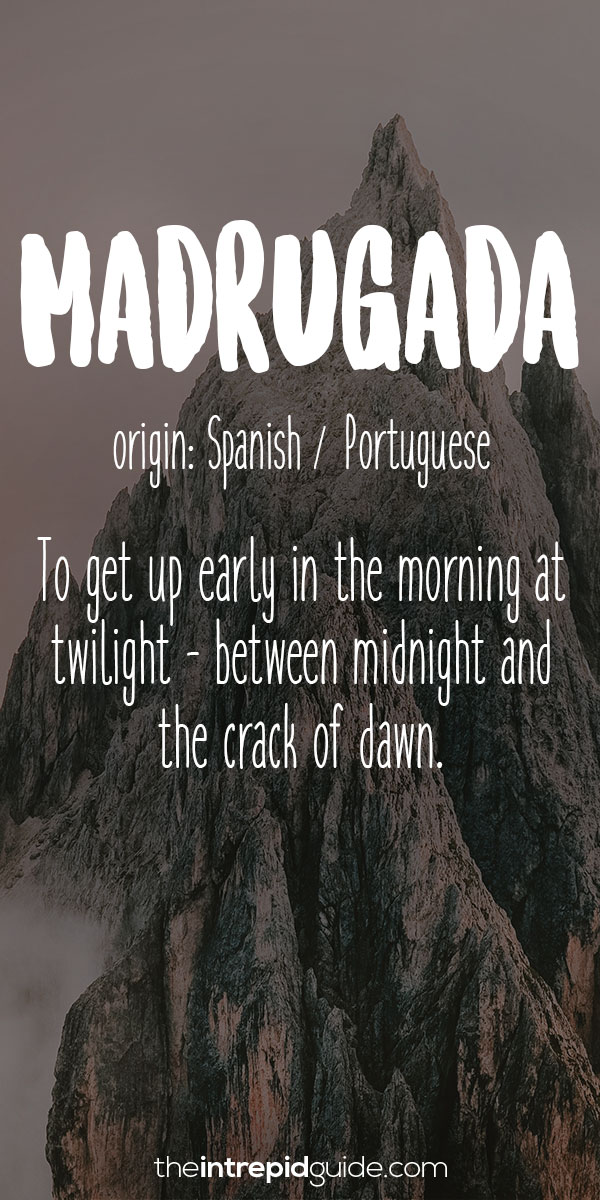
Pena ajena – Ajeno/a generally means ‘someone else’s’ or ‘other people’s’. Literally, meaning ‘sorry for others’, pena ajena is the feeling of humiliation or embarrassment you get upon watching another person’s embarrassment. It’s so embarrassing that it makes you cringe.
Sobremesa – Shared mealtimes are a very important part of Spanish culture, and the time spent after the meal just chatting and relaxing is very important. So important that they even have a word to describe it. Sobremesa literally means ‘over the table,’ is a Spanish expression that describes that wonderful period after the meal is finished but you continue sitting at the table chatting and enjoy each other’s company.
Tuerto – A one-eyed man, blind in one eye .
Tutear – To speak to someone you know well (usually friends and family) informally by addressing using the ‘tú‘ form instead of the more formal ‘usted‘. The term tutoyer is used in French to describe the same thing where the speaker uses the informal second-person pronoun tu rather than the formal vous.
Vacinlando – Vacilando is a beautiful Spanish word which describes the journey or experience of travelling, is more important than reaching the specific destination.
Learn Spanish for travel! Get my free European Spanish travel phrase guide here and my Latin American travel phrase guide here.
Swahili
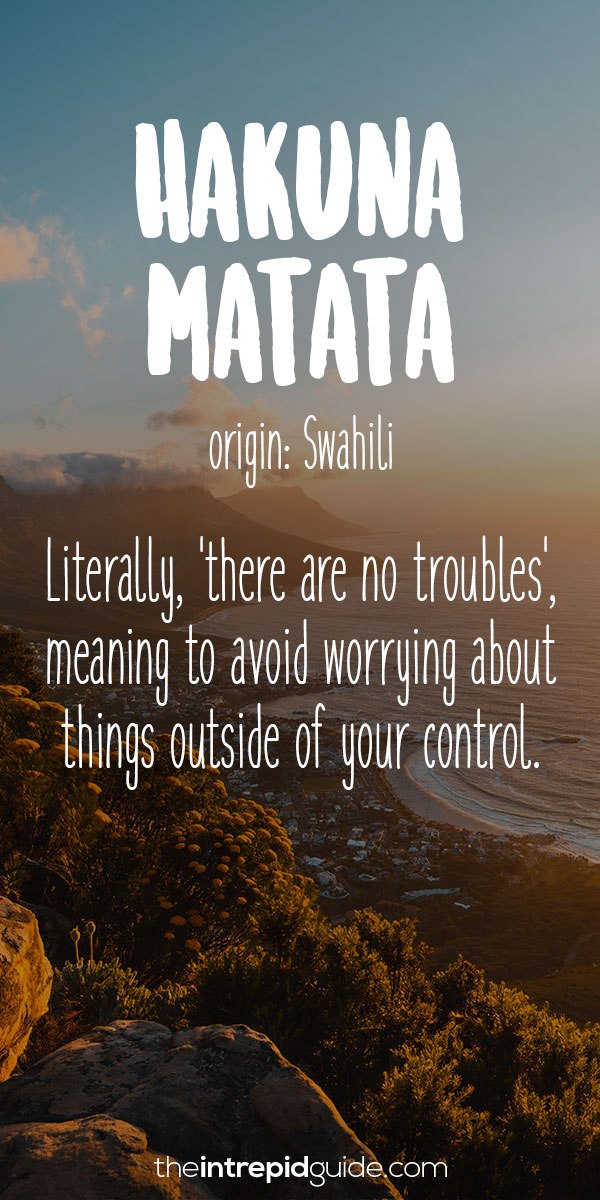
Swedish
Badkruka – A person who feels somewhat hesitant or doesn’t like to swim in an open body of water due to its low temperature.
Blunda – Blunda is a Swedish word that means to close or cover your eyes to avoid seeing something or facing a hard truth. It’s similar to the English expression ‘turn a blind eye’, or can be the simple act of ignoring something.
Duktig – If a Swede says you’re duktig, that’s a huge compliment, because they are saying you’re skilled, capable, or hard-working. Duktig comes from the Swedish verb duga, which means ‘to be good for / to be acceptable for’. You can use duktig on its own, just as you would say ‘you’re such a hard-worker!’ or ‘good girl/boy!’ to a child. Duktig refers to an action of some sort, whether that’s a job or a specific task.

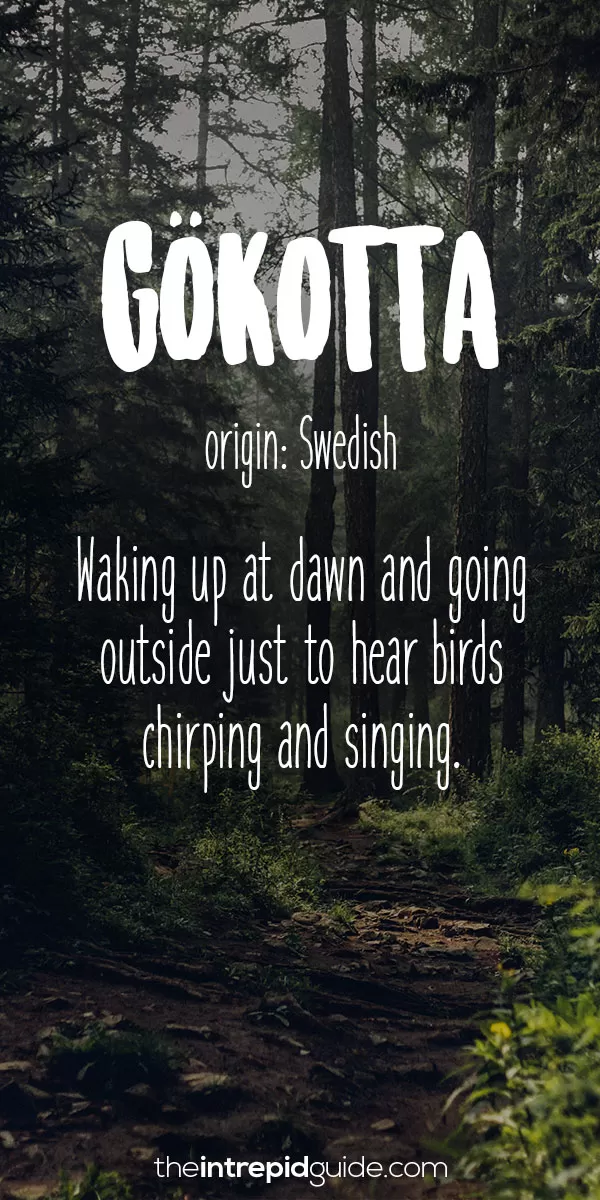
Harkla – Harkla is a fantastic verb that means something very similar to ‘to clear one’s throat’. A perfect example would be the moment before you’re about to give a speech and make a half-cough so you can speak clearly.
Hinna – Hinna is a common Swedish verb that means ‘to be on time’ ‘to find the time’.
Jobbig – Jobbig is an all-encompassing word that means troublesome or trying, annoying or difficult. It can be used to refer to people, things, events – almost anything that is difficult, annoying, or tedious.
Lagom – Lagom means ‘just the right amount’, it’s neither too much, nor too little, but juuuuuust right. Lagom is important in Swedish culture, where you don’t want to ‘stand out’ but having or doing too much.
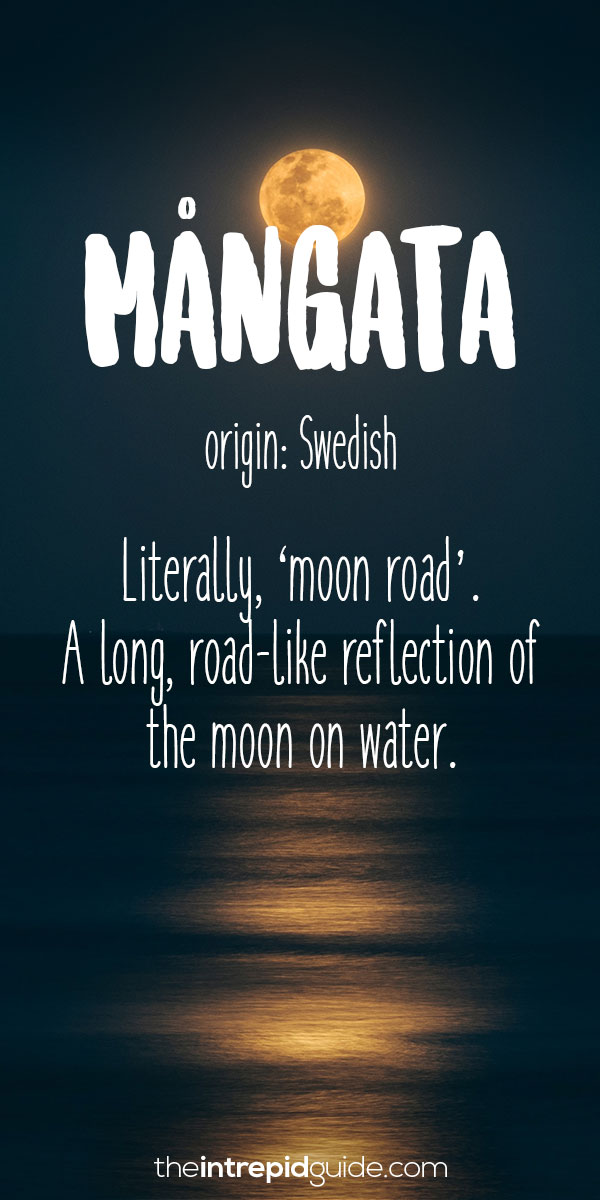
Mormor / farmor / morfar / farfar – We could definitely use these genius Swedish compound words in English to describe each of our grandparents. Mormor, farmor, morfar, farfar literally means mothermother, fathermother, motherfather, fatherfather – respectively. That is, mormor is your mother’s mother, farmor is your father’s mother, morfar is your mother’s father and farfar is your father’s father. So, the question is, do you want to see more of mormor and less of farfar? So see farmor far less? And while we’re at it, barnbarn (literally, ‘childchild’) is the Swedish word for grandchild.
Mysa – Mysa is a Swedish verb for feeling content, cozy and enjoying oneself, especially at home. Not to be confused with the Danish, hygge which relates to any activity or part of your day, mysa refers specifically to being at home.
Orka – This common verb in the Swedish language means ‘to have the energy’.
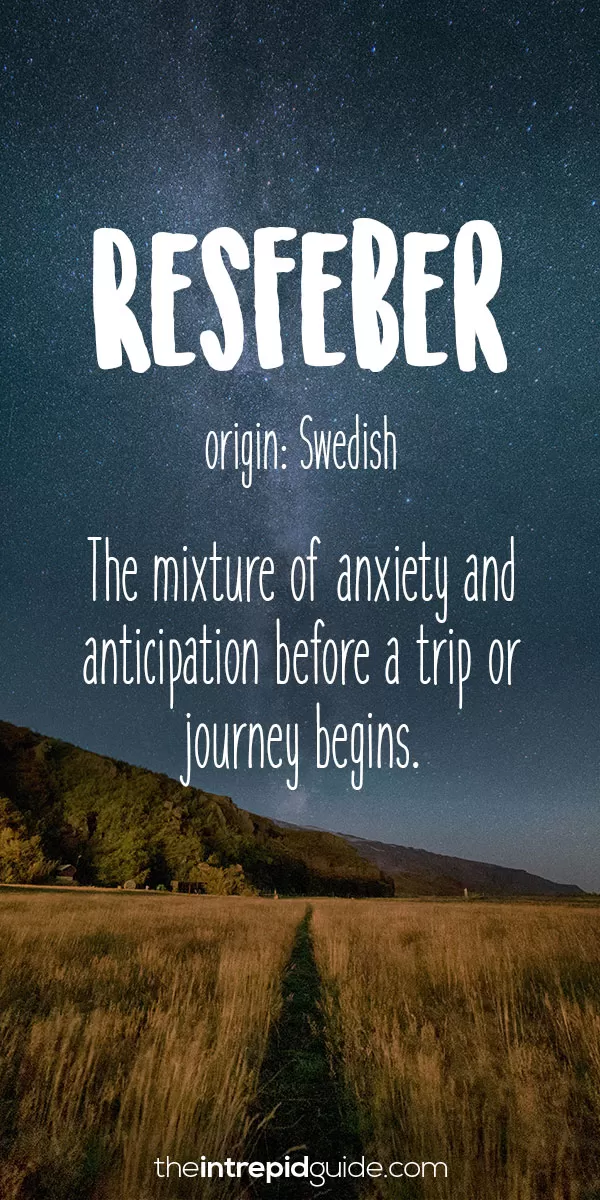
Tidsoptimist – Literally, a ‘time optimist’ this is a person who is constantly late because they think they have more time than they actually do.
Tretår – When two cups of coffee isn’t enough, you go for a second refill or ‘threefill’ of coffee. In Swedish, ‘tår’ means a cup of coffee and ‘patår’ is the refill of said coffee. A ‘tretår’ is therefore a second refill, or a threefill.
Vobba – Describes the very specific act of a parent taking a paid day off to take care of their sick child but still work, for example they check emails or take calls. Vobba is a mash-up of the two verbs att vabba (to take care of a child) and att jobba (to work).
Vabba – From vobba, comes vabba, a shortened version of vård av barn, which means ‘to be at home with the kids’.
Learn Swedish for travel! Get my free Swedish travel phrase guide here
Tagalog

Tampó – In Filipino culture, tampó is when a person withdraws his or her affection or cheerfulness towards someone who has hurt them. A mild case of ‘to hold a grudge’ where you’re someone between hurt and disappointed. It usually occurs between people related to each other. For example, when a husband forgets to bring his wife flowers for their anniversary, she can have ‘tampó‘ against him.
Kilig – Kilig can be roughly translated as ‘romantic excitement’, it describes the happiness and giddiness you feel when something romantic takes place, either to you or someone else. It’s the feeling of butterflies in your stomach when you catch your crushes’ eye for the first time, witnessing a marriage proposal, or watching your favourite TV show couple.
Tamil
Oodal – An exaggerated, fake anger that usually follows a quarrel between lovers.
Tshiluba (Congo)
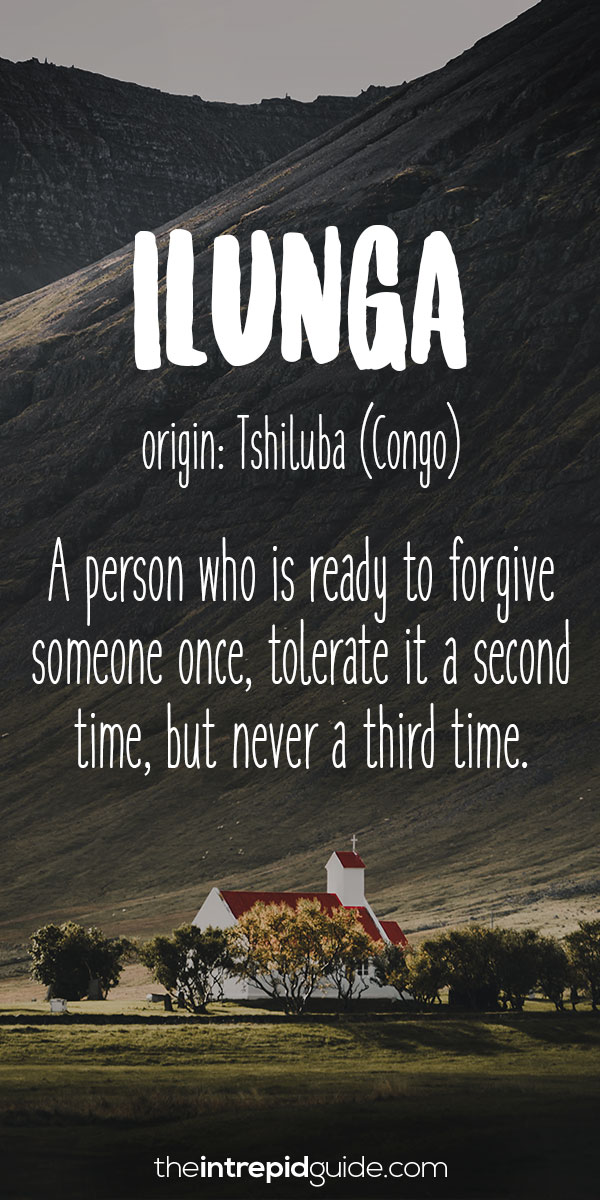
Tulu (Indian)
Karelu – The mark left on the skin from wearing something tight, such as jeans, socks, or a bra.
Turkish

Urdu
Goya – This Urdu word refers to a feeling of wonder and disbelief that accompanies a particularly realistic fantasy. The suspension of disbelief makes it seem so real that it temporarily becomes reality. This is usually associated with good storytelling.
Wagiman

Welsh
Glas wen – The literal translation is ‘blue smile’, and is used to describe a mocking sarcastic smile.
Hiraeth – Pronounced [here-eyeth] (roll the ‘r’), this beautiful Welsh word is much like the Portuguese saudade mentioned earlier or the Romanian dor, it conveys a feeling of homesickness, sense of regret, along with a general sadness over the lost or departed. This is a longing for one’s homeland, or even a romanticized past, with a yearning for it to come back.
Yaghan
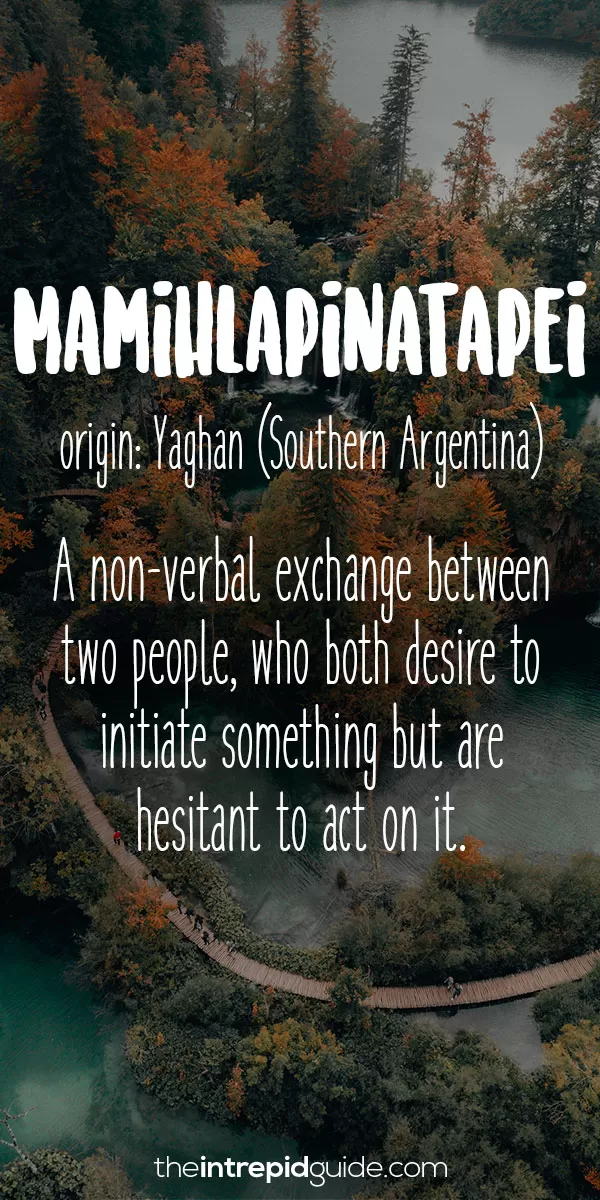
Yiddish
Shlimazl (שלימזל) – A chronically unlucky, usually inept, clumsy person.
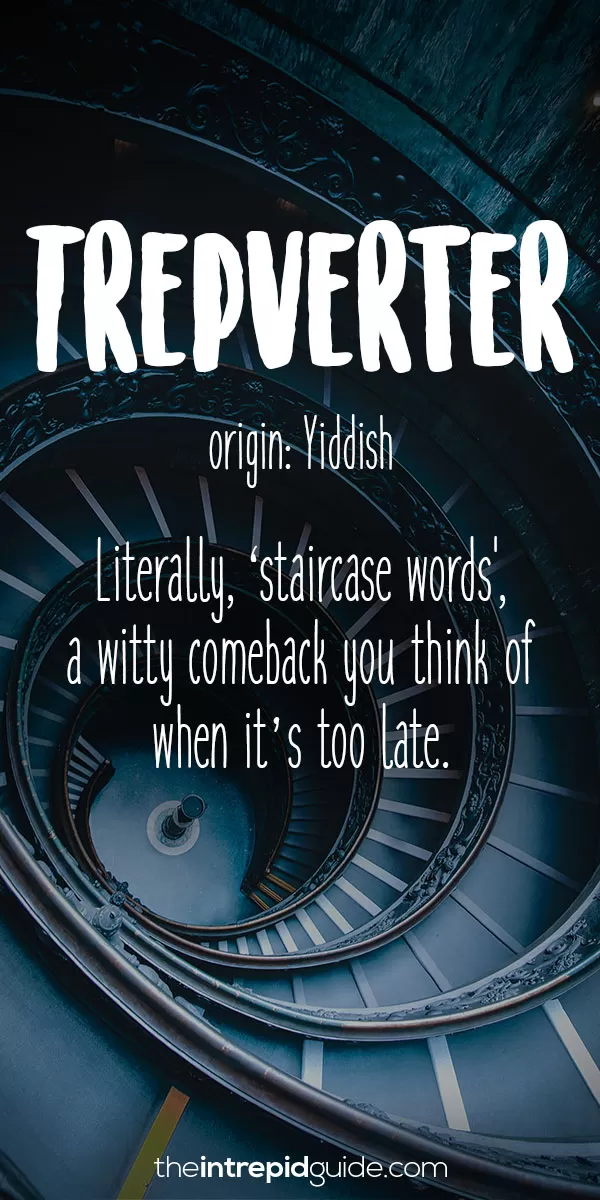
Luftmensch (לופֿטמענטש) – Luftmensch is used to refer a person with their head in the clouds. They are more concerned with airy intellectual pursuits than practical matters like earning an income. From the Yiddish לופֿט (luft, ‘air’) and מענטש (mentsh, ‘man’).
Farpotshket – Pronounced [fahr-POTS-SKEHT], farpotshket is when you or someone you trust tries to fix something but only ends up making things worse, causing irreparable damage. All you can do is shrug, knowing that you should’ve known better. Farpotshket also has an associated verb – potshky (POTs-ski), which means ‘to fiddle with something in a well-meaning and purposeful way, but with a complete lack of competence.’
Chutzpah – Is an untranslatable Yiddish word for adopting a ‘don’t-take-no-for-an-answer’ attitude where you’ll build up the guts to do something ballsy.
Zulu
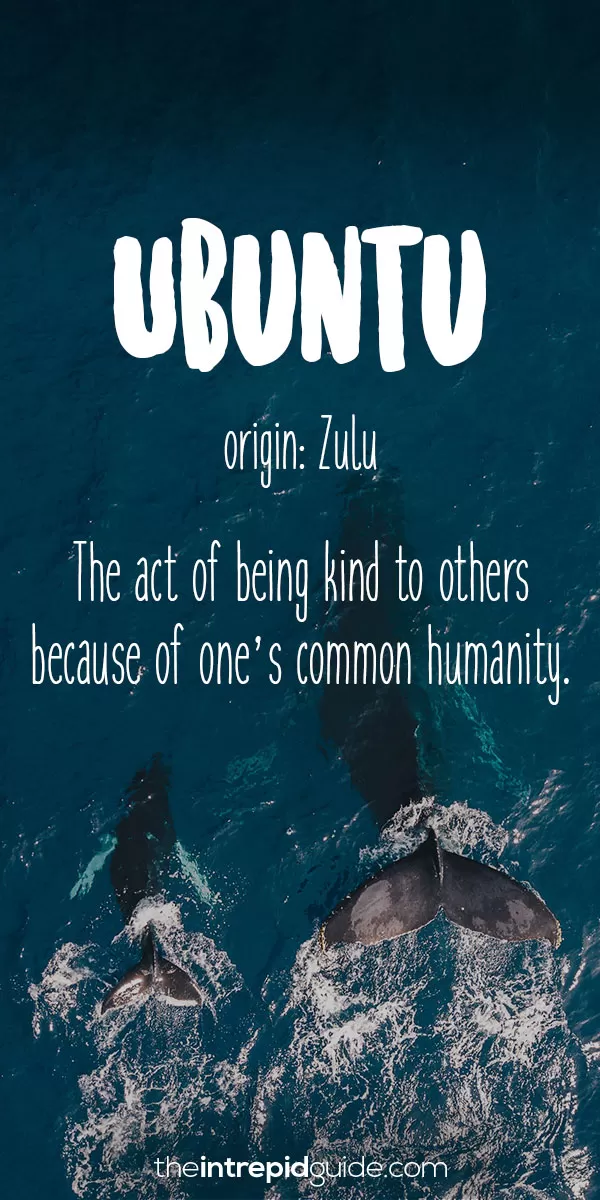
Over to you!
Which one of these words in your favourite? Was it the Malay, pisan zapra – the time it takes to eat a banana or the Portuguese cafuné – the act of tenderly running your fingers through someone’s hair. Share your favourites in the comments.
Can you think of any other ‘untranslatable’ words? Have you ever come across words and phrases that could not be translated into your native language? Let me know in the comments and I’ll add them to the list!
Want to know more about learning languages? Start here!
- 22 Top Language Learning Resources You Should Use
- How to Say ‘I Love You’ in 128 Different Languages [Ultimate A-Z Guide]
- How to Learn Languages Like Crazy, Even If You Have a Crazy Life [3-Step Method]
- 10 Proven Memory Hacks: How to Remember New Vocabulary Faster
- How long does it REALLY take to learn a language? [A Practical Guide]
- 18 Unexpected Advantages & Health Benefits of Learning A Foreign Language
- 23 Cool Gift for Language Learners They Will Actually Use and Love
- Memrise vs Duolingo: Which Language App is Best For You?
- Mondly Review: 10 Ways Mondly Drastically Improved My Language Learning
- 6 Language Learning Tips: How to Learn a Language from Home
- What Type of Language Learner Are You? Your 4-Step Personalised Learning Plan
- 44 Best Movies on Disney Plus for Learning Languages
- 13 Ways to Seamlessly Integrate Language Learning into Your Daily Life
- 10 Pro Tips: How to Learn a Language with a Full-Time Job
- 7 Reasons Why You Should Go on a Language Holiday
- Essential Travel Phrases: How to be Travel Fluent in 10 Simple Steps
- How to Learn Your First Foreign Language in 8 Simple Steps: A Beginner’s Guide
- 11 Life-Changing Reasons Why You Should Learn a Language
- 42 beautiful Inspirational Quotes for Language Learners
- Language learning tips: 11 Polyglots Reveal The Secrets of Their Success
- Top 10 Best Ways to Learn a Language Better and Faster
- How Many Languages are there in the World?
- 78 FREE Dictionaries to Learn a Language Fast [Free eBook Download]
- 22 KEY Travel Phrases That Will Transform Your Travels [Free Guide]
Like it? Pin it for later!
Download Article
Download Article
Learning vocabulary doesn’t have to be painful! Breeze through foreign language vocabulary tests and know words for life. Tried-and-true methods like flashcards are still very effective, but technology has opened up a world of media and vocabulary learning apps that can maximize your learning potential. Study words in context, and practice as often as you can to retain vocabulary and increase your fluency.
-
1
Study in frequent short bursts. Learning a foreign language well takes time — there’s no way around it. Long, infrequent cram sessions just won’t work. Instead, study or quiz yourself in short bursts of 5-10 minutes. Try to do several of these throughout the day.[1]
- Once you build up a good knowledge of the language, you will retain more from longer sessions.
-
2
Trust flashcards. While they seem like the bane of any language student’s existence, flashcards are actually a proven way to learn vocabulary. They’re also cheap and easy to make. You can keep a stack of flashcards on you and quiz yourself whenever you have a few spare minutes throughout the day. Just focus on a few words at a time.[2]
- You can use index cards for a traditional choice, or websites or apps to create virtual cards.
- The key to flashcards is repetition—use them often, and quiz yourself on old flashcards, too. Use the words as often as you can to help them stick.
Advertisement
-
3
Work with new words, don’t just look at them. Studies show that learners need to encounter words several times in different contexts before they really stick. To speed this process up, whenever you learn a new word, look at how it is used in context, and then follow a series of steps:
- Pronounce the word and spell it
- Study the meaning of the word (look it up if you don’t know it)
- Create a sentence in your own words using the word
- Write the new word and its meaning several times
-
4
Read, write, and repeat phrases to cement them in your brain. The same holds true for learning a new phrase. Say it outloud, check their meaning if you aren’t sure, and make up new sentences that use the phrase.[3]
- To retain vocabulary, keep using these words and phrases, even after a test or after moving on to new topics.
-
5
Make friends with a conversation partner. Practicing your foreign language with native speaker or someone who knows it well supercharges your learning. Not only will you have the chance to put your knowledge into action and build confidence in speaking, you’ll also learn new vocabulary from you partner. All while having fun![4]
- You can find a friend, tutor, or teacher who you can practice with. Check with a language instructor, look online for language groups in your area, or look for someone to practice with online via language learning sites.[5]
- You can also try a tandem partnership with someone who is trying to learn your language. Spend part of the time practicing the language that is foreign to you, then switch to your own language and help your partner learn.
- You can find a friend, tutor, or teacher who you can practice with. Check with a language instructor, look online for language groups in your area, or look for someone to practice with online via language learning sites.[5]
Advertisement
-
1
Get creative with some mnemonic devices. Making things interesting and funny greatly increases the amount of vocabulary you retain. Get in the habit of coming up with memory aids, or mnemonic devices, for new vocabulary. Have fun—the sillier, the better! For instance:
- You can develop some devices based on sound. If you’re learning the word “mesa” (“table” in Spanish), say to yourself “Yolanda made a huge MESS all over the MESA.”
- You can create other devices based on meaning. For instance, if you’re learning the word дом (dom or “home” in Russian), recognize that shares a root with the Latin word “domus” (“home”) and related English words. Think of a silly phrase like “Donald has a dozen DOMESTICATED dogs in his DOM.”
-
2
Visualize the meaning of words. Even if you can’t get super creative with all of the words and phrases you learn, it still helps to simply create a visual picture of what you are learning. This can be as simple as imagining the thing you are studying. If you’re learning “el pan” (“bread” in Spanish), picture a loaf sitting in a pan. If you’re learning “ir” (“to go”), picture a fast car going down the street.
-
3
Try diglot weaving. While it sounds like a complicated term, diglot weaving is actually a simple and fun way to learn new words. Simply replace a word in a sentence in your native language with the corresponding word in the foreign language. Since you can lean on your native language while learning foreign words, it’s great for beginners. Examples of diglot weaving include:
- ”My friends and I split a pizza at the lunch Tisch” (when learning the German word “Tisch,” or “table”).
- ”Romeo told Juliet he’d lover her siempre” (when learning the Spanish word “siempre, or “always”).
Advertisement
-
1
Learn vocabulary in phrases to maximize retention. Words aren’t much good unless you know how to use them. Learning vocabulary in phrases rather than as isolated words is most helpful because it gives you context to help remember the meaning and gives you practicing using the vocabulary in natural ways.[6]
- “J’en ai marre” (“I’ve had enough” in French) is an example of a phrase.
- Learning vocabulary in phrases helps you determine which words to use to “sound right” (called collocations).
- For instance, “I had a cup of powerful tea” and “I had a cup of strong tea” are both grammatically correct in English, but the latter sounds right because it is said more often.
-
2
Draw on multimedia sources to enrich your learning. Watching television, films, and other videos in foreign languages gives you chances to learn new vocabulary and to hear how it is used in authentic speech. If you are interested in the sources, you are more likely to pay attention and learn, so choose some that you love![7]
- Podcasts, YouTube videos, streaming films and programs, songs, and similar sources can all be great ways to learn.
- As you watch and listen, pay attention to any vocabulary you know, and write down new words and phrases you hear.
-
3
Read often to build context. You can pick up lots of vocabulary quickly from reading, especially if you read out loud. When learning a foreign language, make it a point to read at for at least a few minutes each day. Read whatever you find interesting.
- Studying a variety of texts is a surefire way to pick up vocabulary. Try reading the news, fiction, essays, comics, and even advertisements.
- When you encounter new words, try to guess their meaning first, based on the context. Then write them down and look them up later for practice and study.
-
4
Try language learning apps. There are tons of possibilities out there, including Duolingo, Drops, and Memrise. While you can’t really learn a language just from studying apps, they can be a great way to build vocabulary in a fun, interactive way.[8]
- Most apps involve games (like matching words to pictures) and other tools that can make the learning experience engaging and help you retain words.
-
5
Group words into categories to pick them up faster. Groups of words together that relate to a common topic are easier to learn than lists of words that are all over the place. Textbooks usually present new words in this way, but if you’re learning on your own, you can follow the same principle.[9]
For instance, if you are studying German and interested in music, you could study not only “die Musik” (“music”), but also words and phrases like:- ”Die Band” (“band”)
- ”Der Jazz” (“jazz”)
- ”Das Konzert” (“concert”)
- ”Ich spiele Gitarre” (“I play guitar”)
- ”Mein Lieblingssänger ist Michael Jackson” (“My favorite singer is Michael Jackson”)
-
6
Focus on cognates to build confidence. If you’re feeling overwhelmed by the amount of vocabulary you have to master to in order to understand and use a foreign language, look for cognates. These are words that look the same or nearly the same and have similar meanings in different languages. That means they’re easy to remember.
- For example, “computer” in German is “der Computer.” Likewise, “to drink” is “trinken,” which looks very similar.
- Just watch out for “false friends,” or words that look the same but actually have different meanings. For instance, “actuel” in French does not mean “actual,” but “current” or “up to date.”
-
7
Make sure to learn the gender of nouns, if applicable. Many languages (like Spanish, German, and Russian) group nouns into different grammatical genders, which usually have no relation to biological gender. Learn the gender together with the noun’s spelling and meaning so you’ll know how to use it properly later on.
- For instance, “dog” in French is «le chien» and NOT “la chien.” Learn the vocabulary as “le chien” and not simply “chien.”
- Similarly, if you’re learning verbs, make sure to study their correct conjugation.
Advertisement
Add New Question
-
Question
What’s the fastest way to become totally fluent?
Tian Zhou is a Language Specialist and the Founder of Sishu Mandarin, a Chinese Language School in the New York metropolitan area. Tian holds a Bachelor’s Degree in Teaching Chinese as a Foreign Language (CFL) from Sun Yat-sen University and a Master of Arts in Teaching English to Speakers of Other Languages (TESOL) from New York University. Tian also holds a certification in Foreign Language (&ESL) — Mandarin (7-12) from New York State and certifications in Test for English Majors and Putonghua Proficiency Test from The Ministry of Education of the People’s Republic of China. He is the host of MandarinPod, an advanced Chinese language learning podcast.
Language Specialist
Expert Answer
You have to be really consistent abut your practice, and keep your study habits intensive so that you really absorb the language. That would be the most reasonable way, If you were looking for the absolute fastest way, you’d need to immerse yourself in an environment where they rely entirely on the target language. That may not be particularly feasible for you, though.
-
Question
How can I learn a language if I’m really busy?
Tian Zhou is a Language Specialist and the Founder of Sishu Mandarin, a Chinese Language School in the New York metropolitan area. Tian holds a Bachelor’s Degree in Teaching Chinese as a Foreign Language (CFL) from Sun Yat-sen University and a Master of Arts in Teaching English to Speakers of Other Languages (TESOL) from New York University. Tian also holds a certification in Foreign Language (&ESL) — Mandarin (7-12) from New York State and certifications in Test for English Majors and Putonghua Proficiency Test from The Ministry of Education of the People’s Republic of China. He is the host of MandarinPod, an advanced Chinese language learning podcast.
Language Specialist
Expert Answer
It’s okay if you live a busy life; you can still learn a language if you’ve got a lot going on. It’s okay to take a day off every now and then, and you can still learn a language over time by spending 30-45 minutes a session.
-
Question
How do you not forget your vocabulary in a foreign language?
Tian Zhou is a Language Specialist and the Founder of Sishu Mandarin, a Chinese Language School in the New York metropolitan area. Tian holds a Bachelor’s Degree in Teaching Chinese as a Foreign Language (CFL) from Sun Yat-sen University and a Master of Arts in Teaching English to Speakers of Other Languages (TESOL) from New York University. Tian also holds a certification in Foreign Language (&ESL) — Mandarin (7-12) from New York State and certifications in Test for English Majors and Putonghua Proficiency Test from The Ministry of Education of the People’s Republic of China. He is the host of MandarinPod, an advanced Chinese language learning podcast.
Language Specialist
Expert Answer
Try grouping the new words in packages, creating connections between then in your mind and helping with the memory. For example, if you’re learning the word «coffee», you could group it with «tea», «milk» and other drinks as a way to remember them all.
Ask a Question
200 characters left
Include your email address to get a message when this question is answered.
Submit
Advertisement
About This Article
Thanks to all authors for creating a page that has been read 140,223 times.



